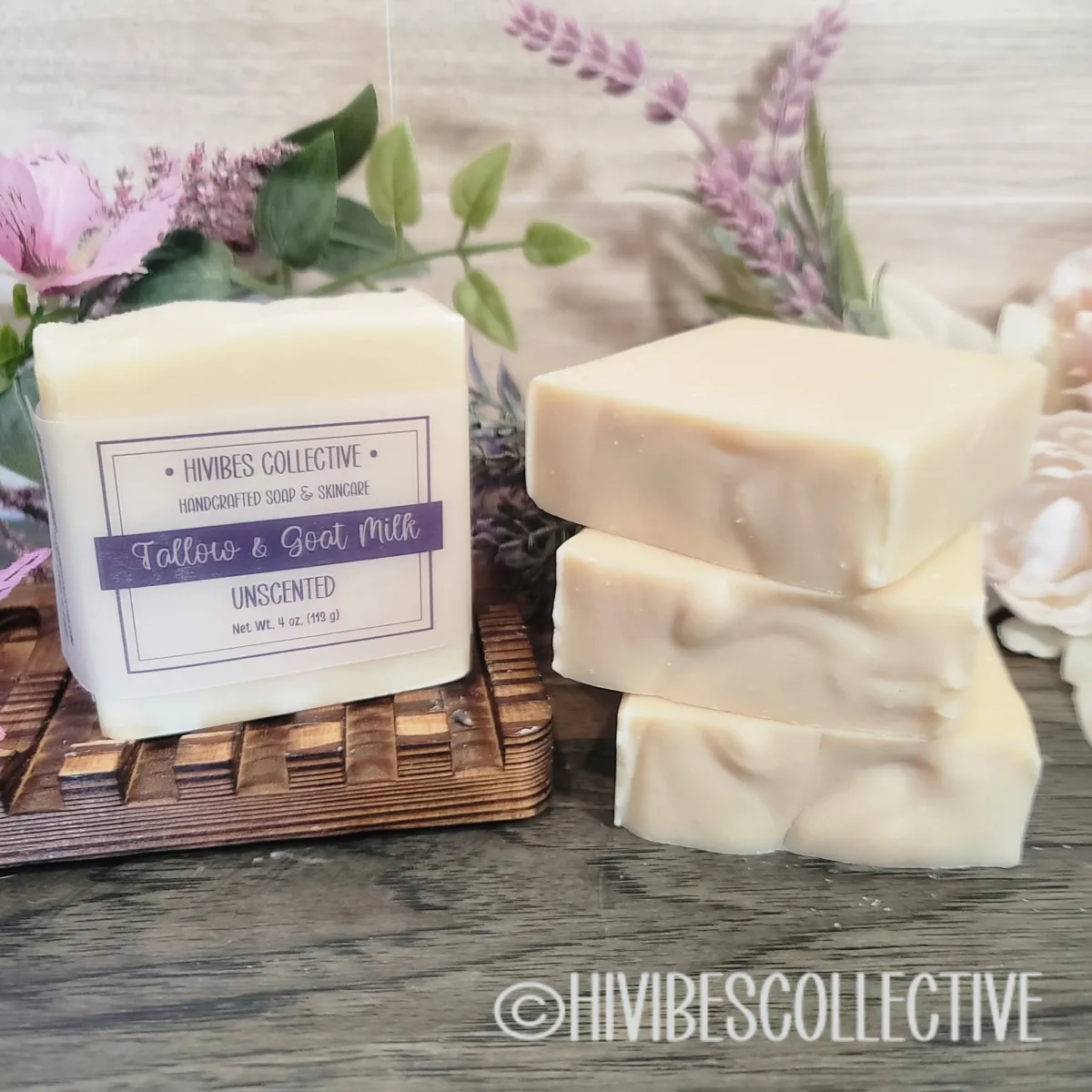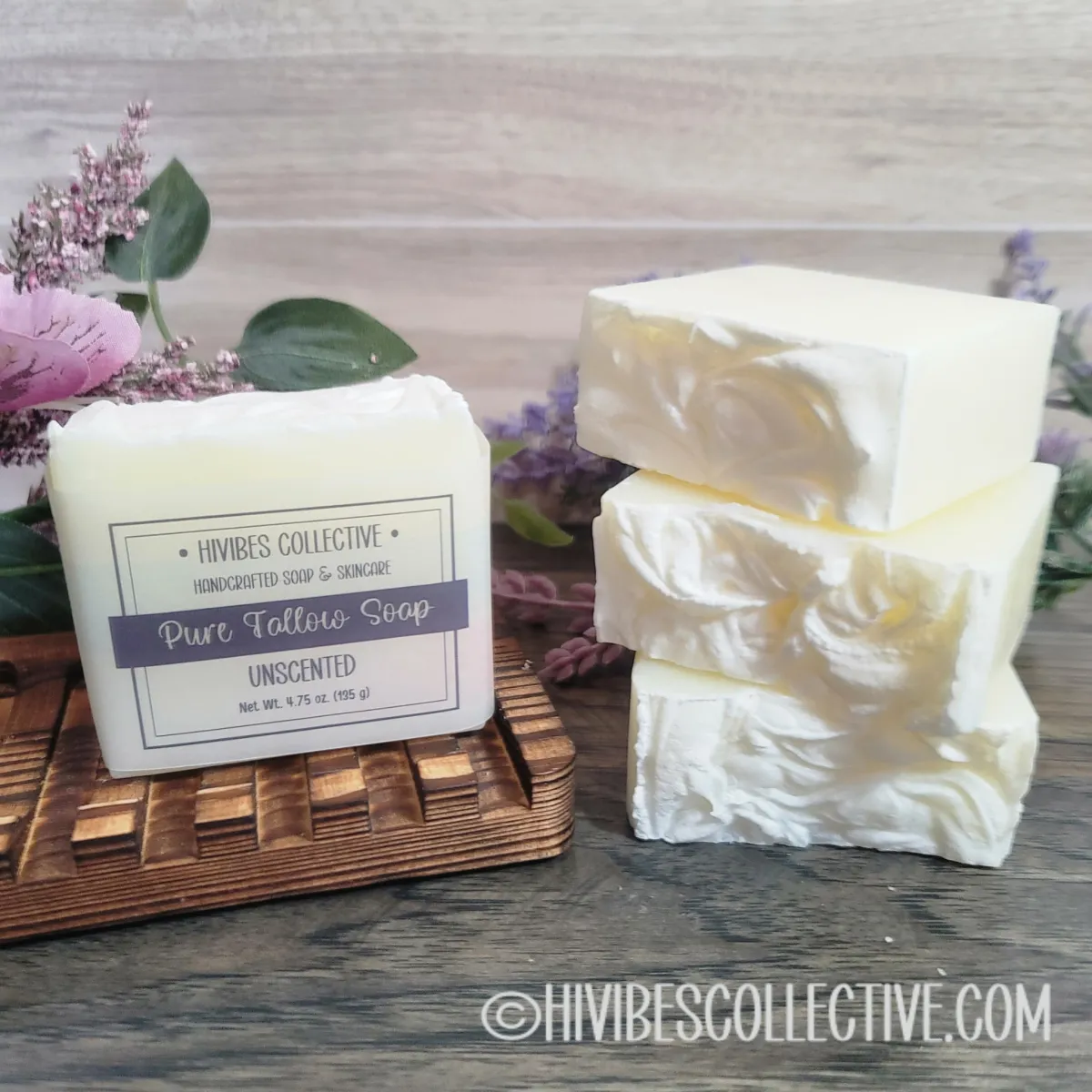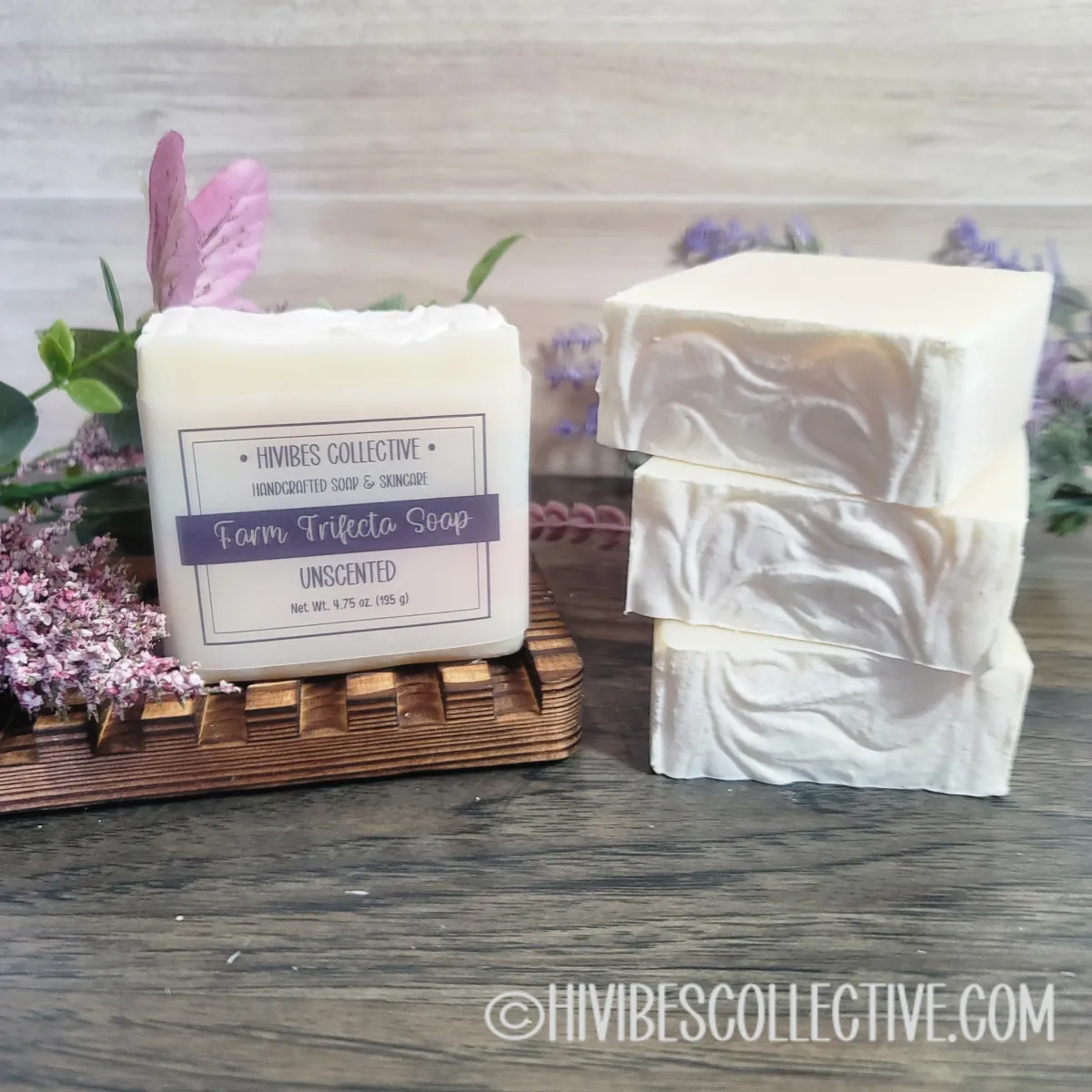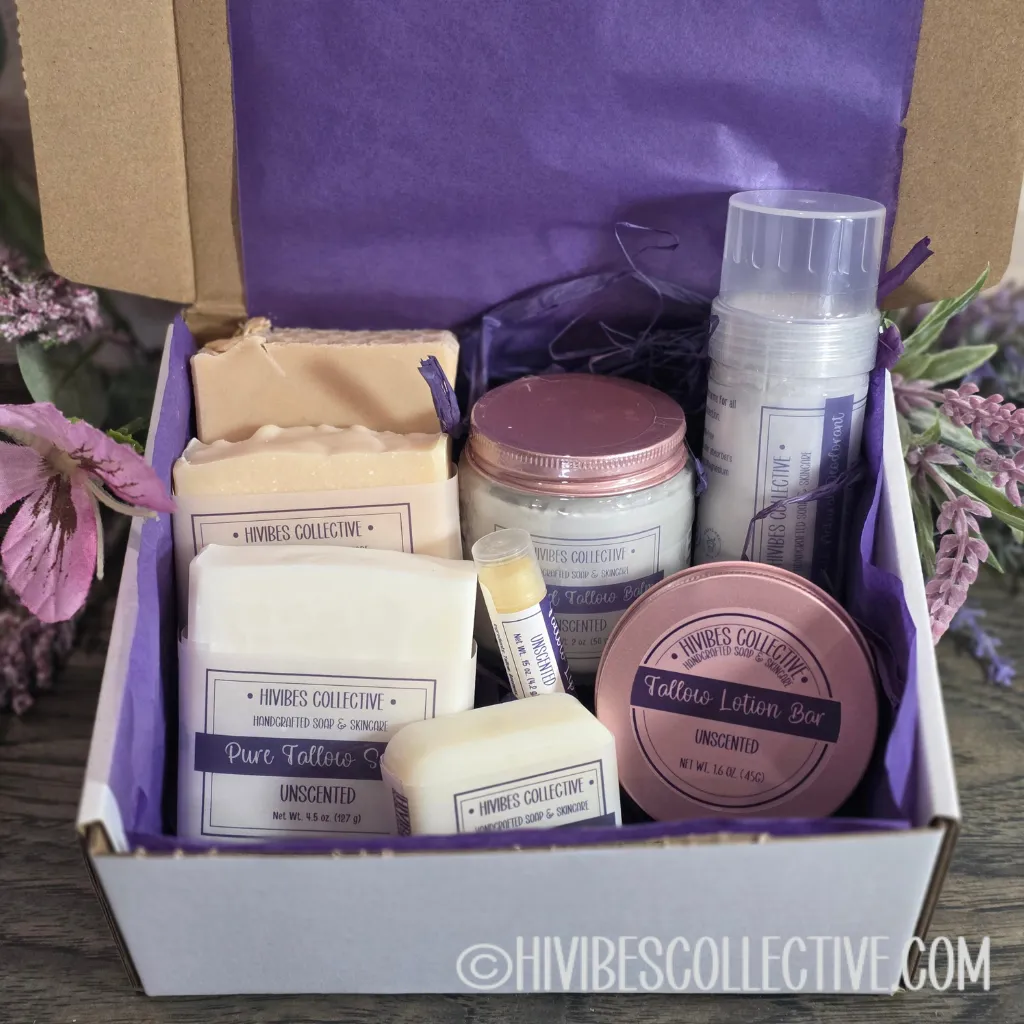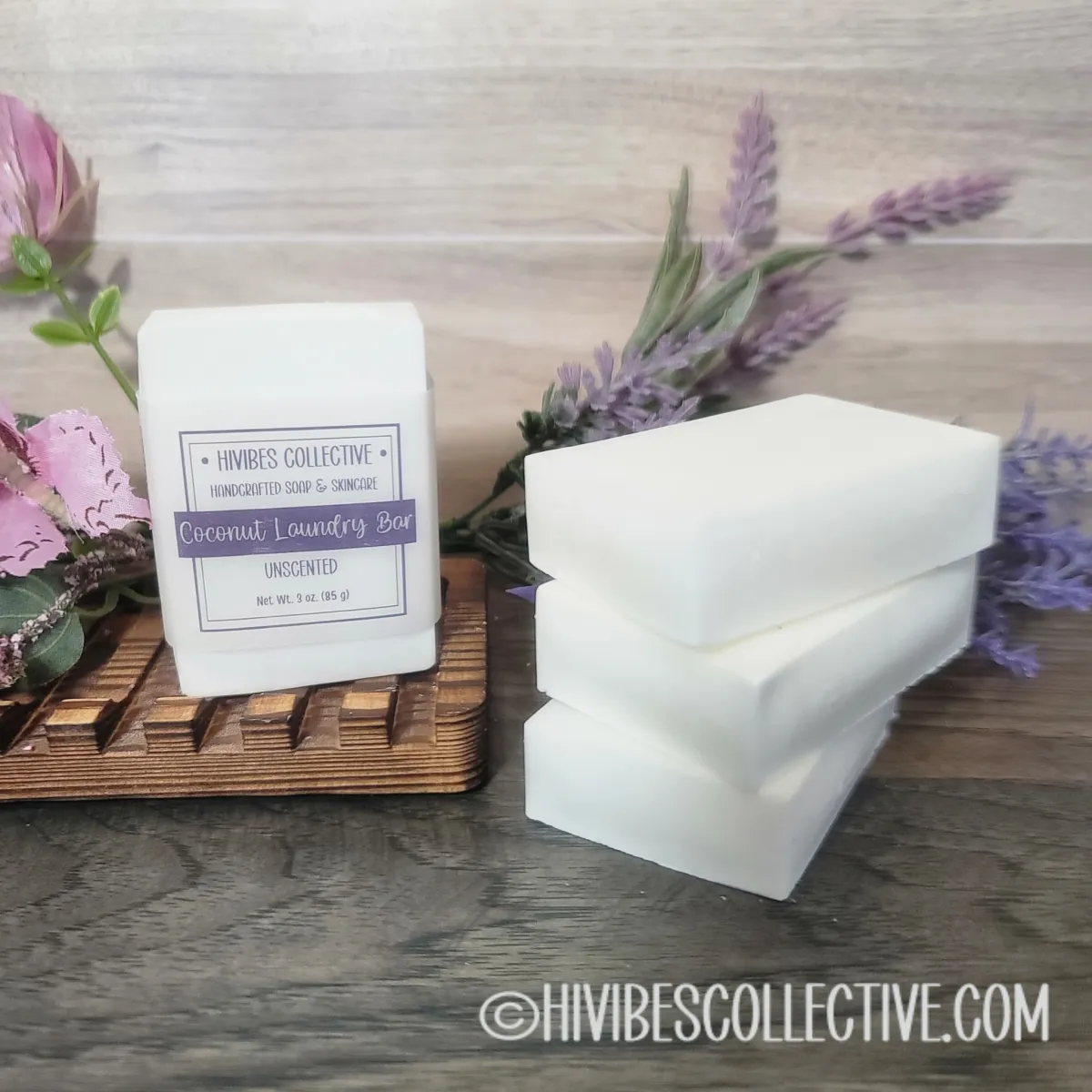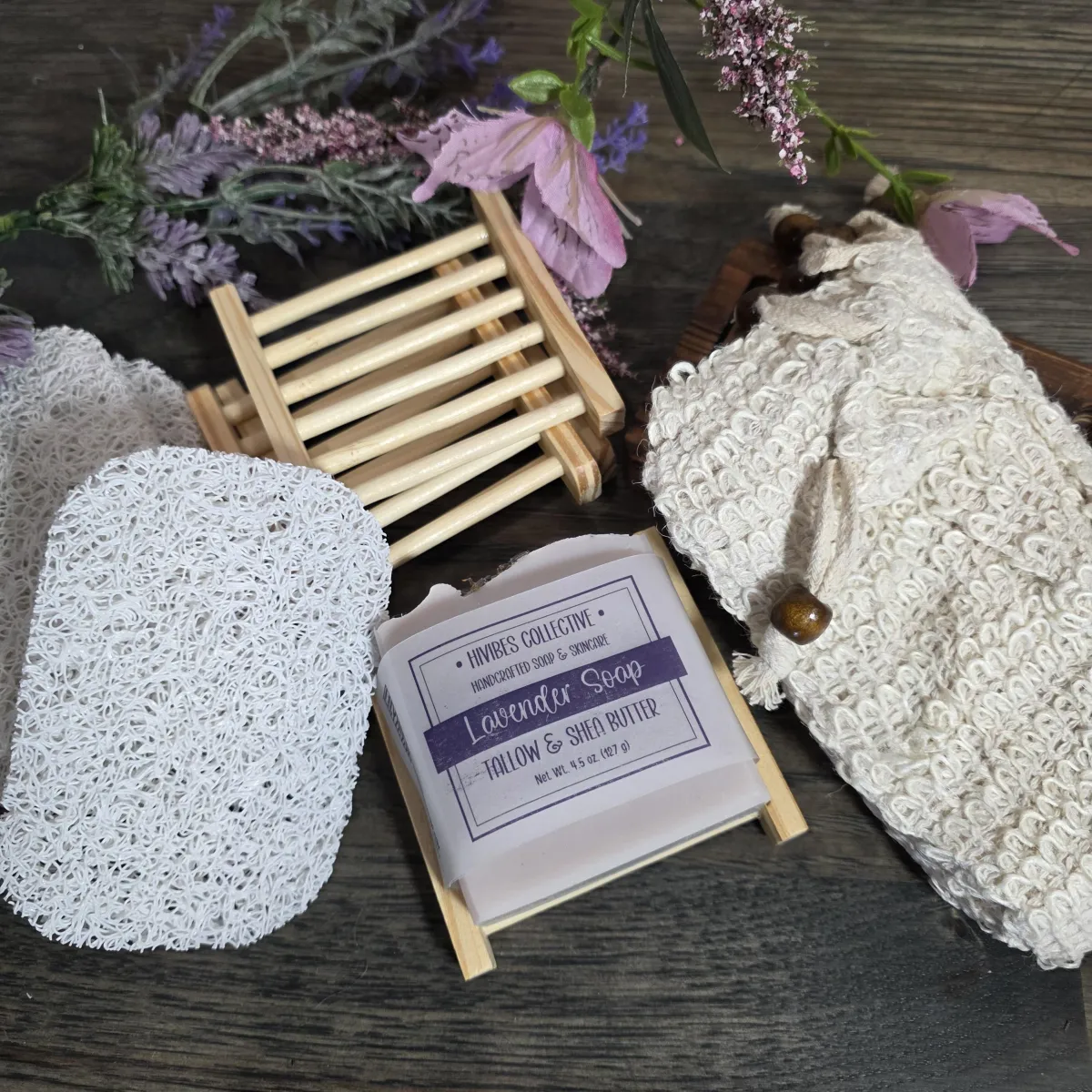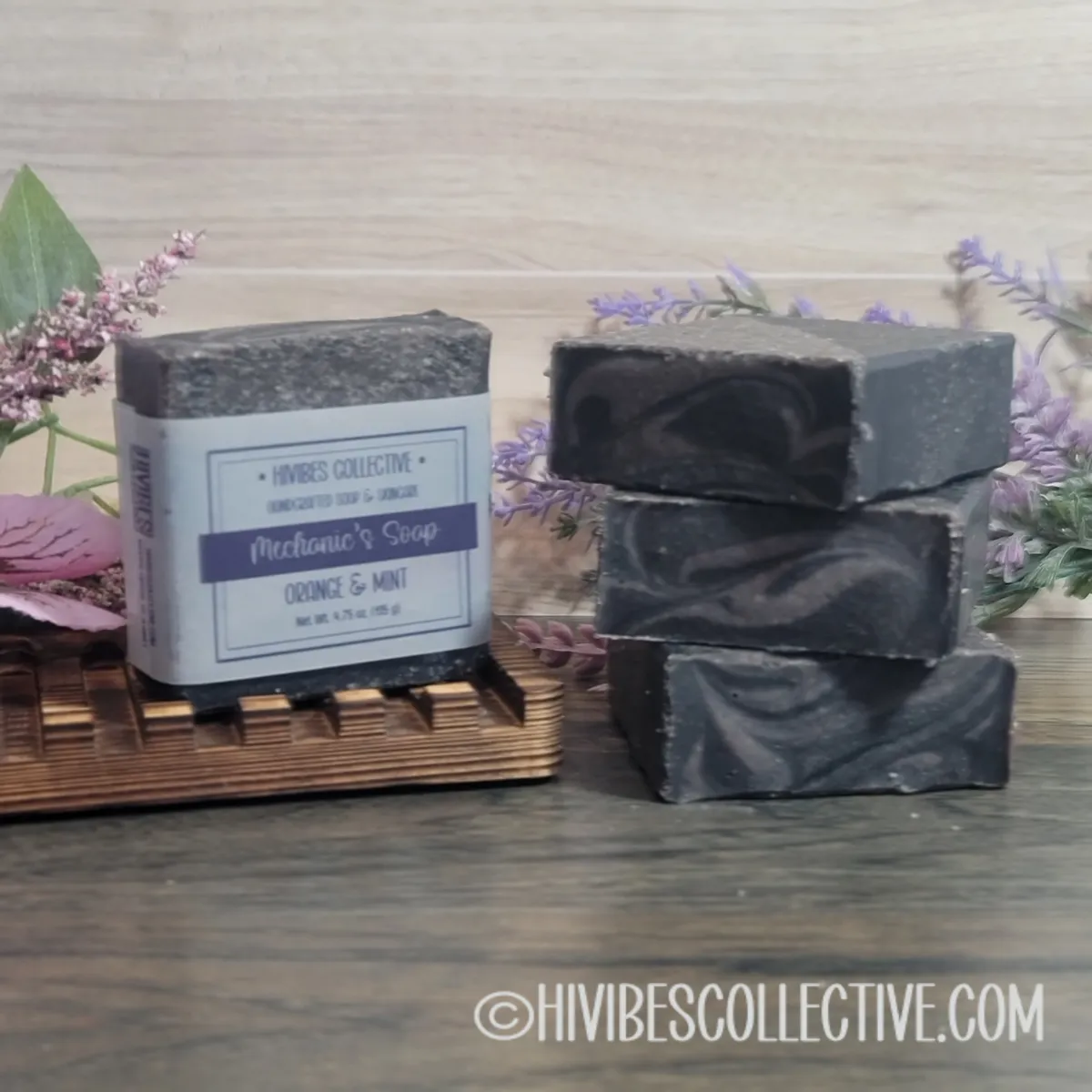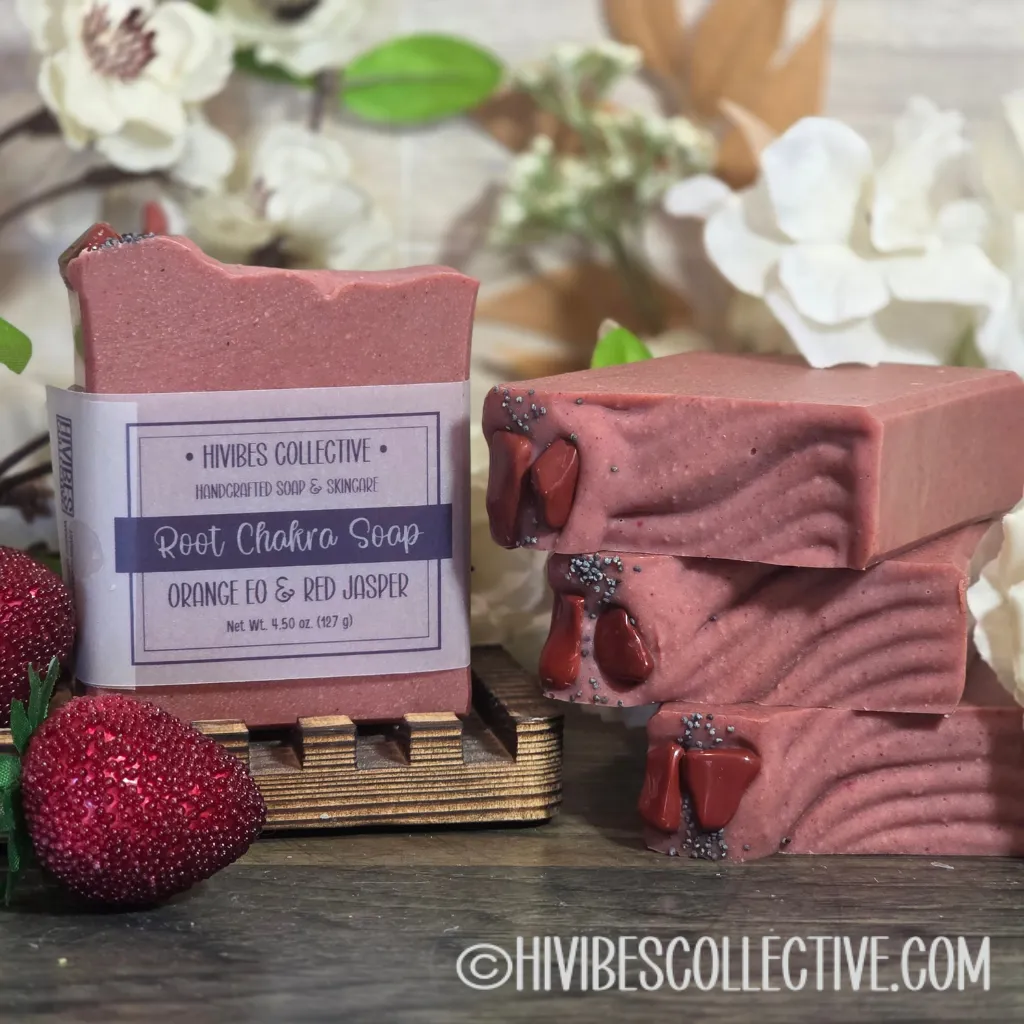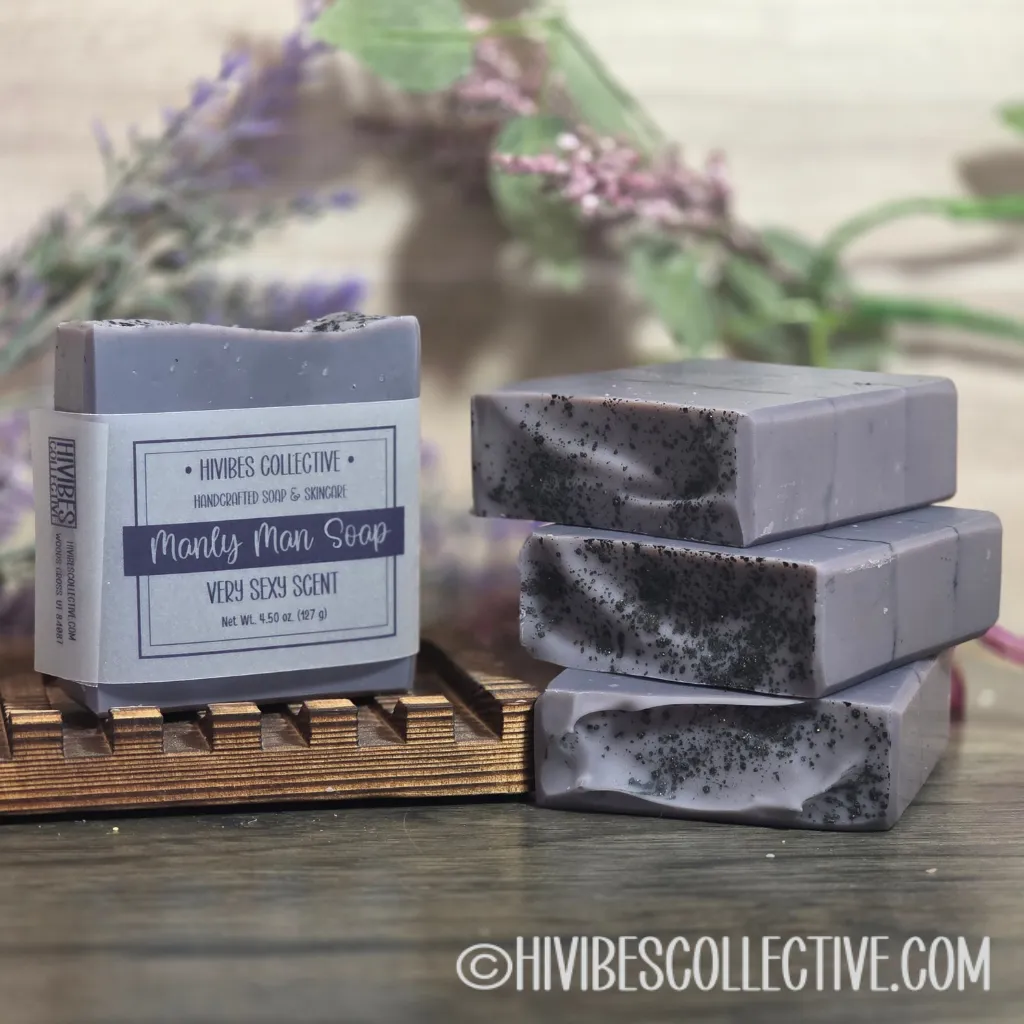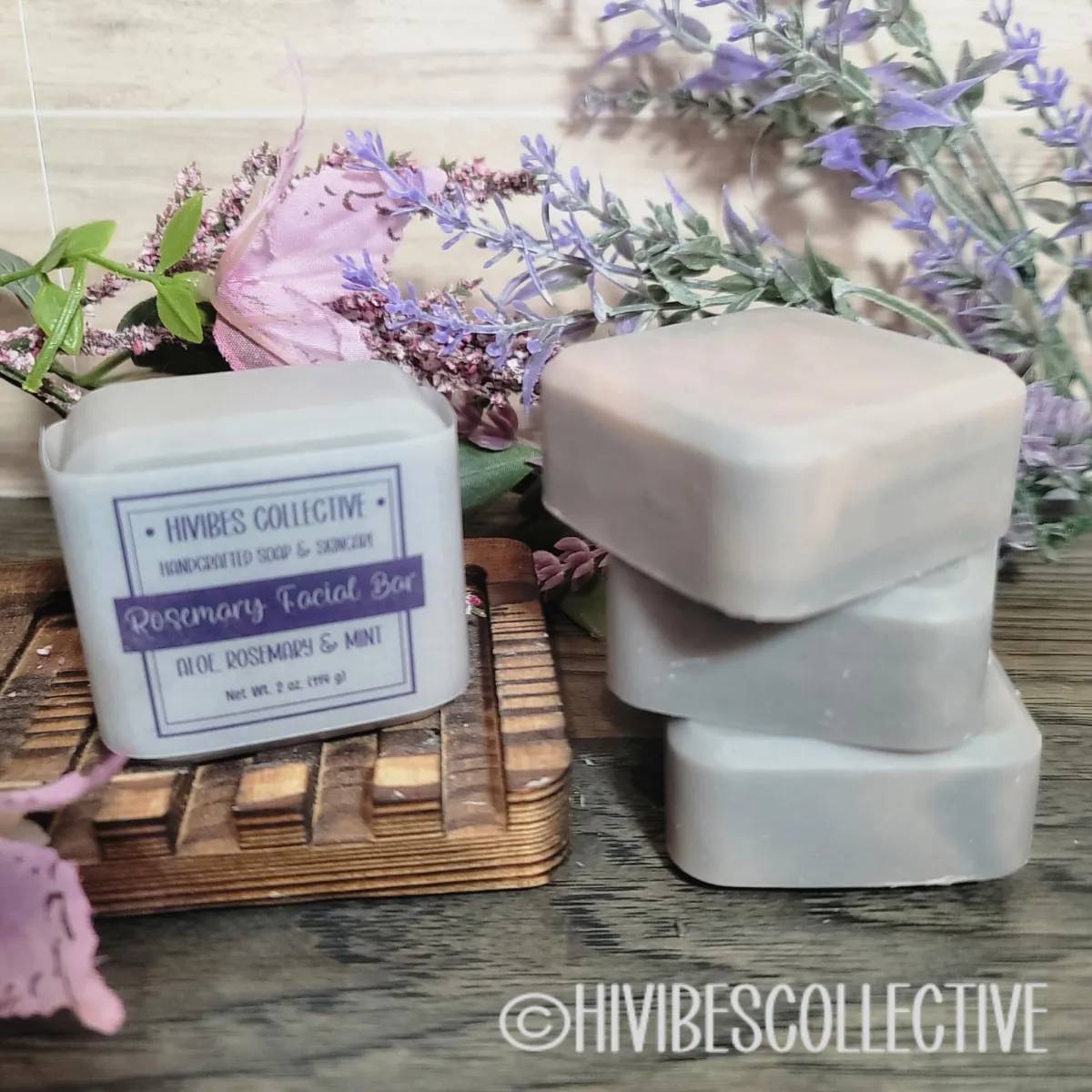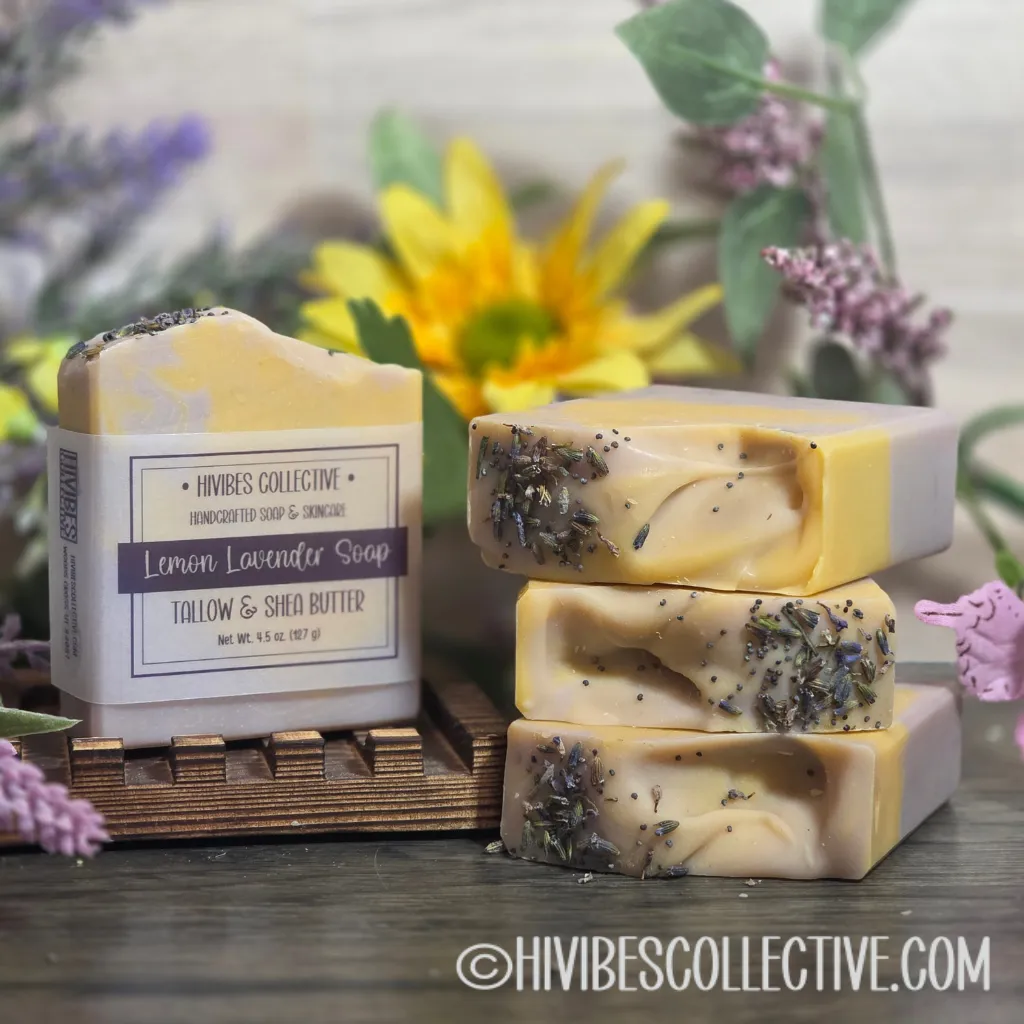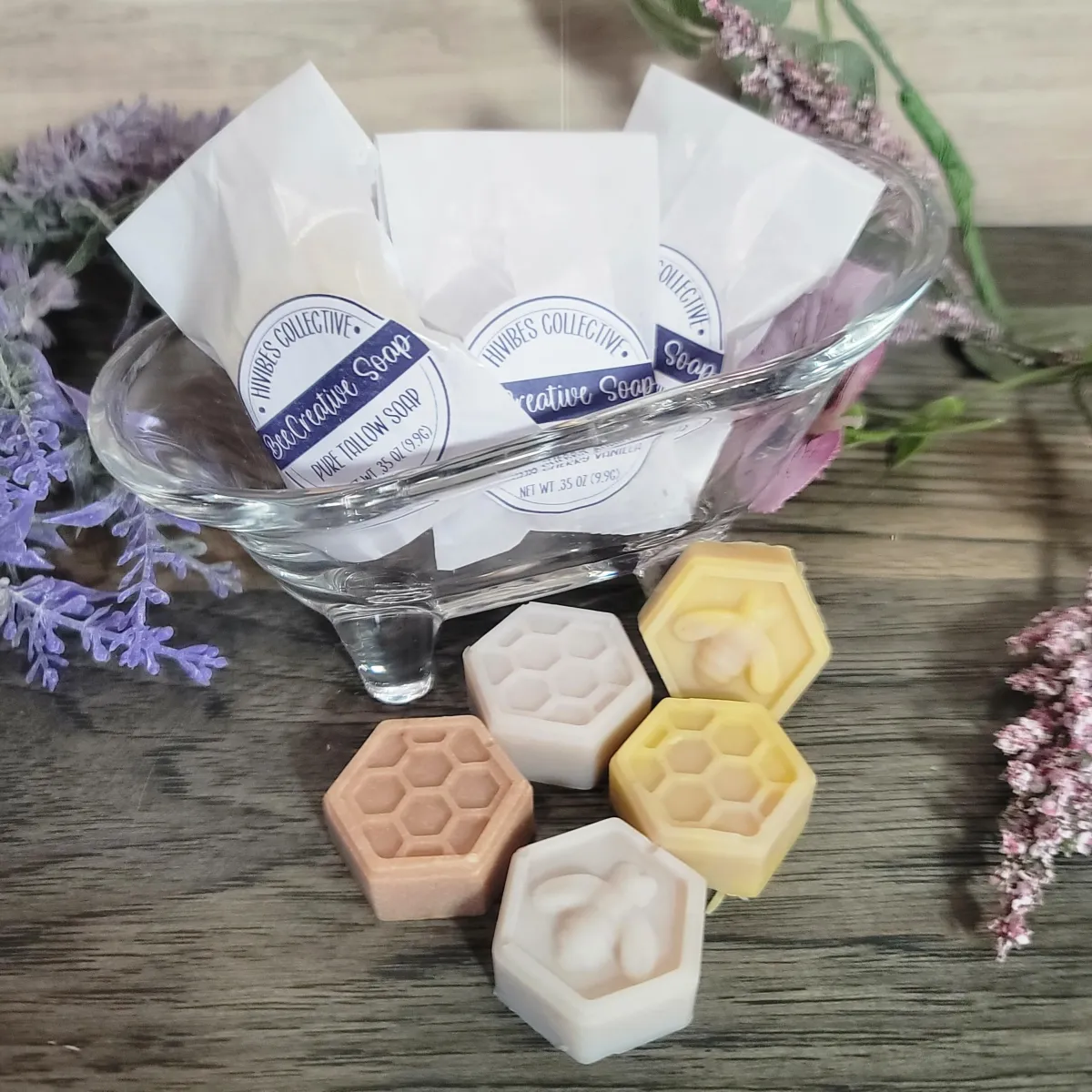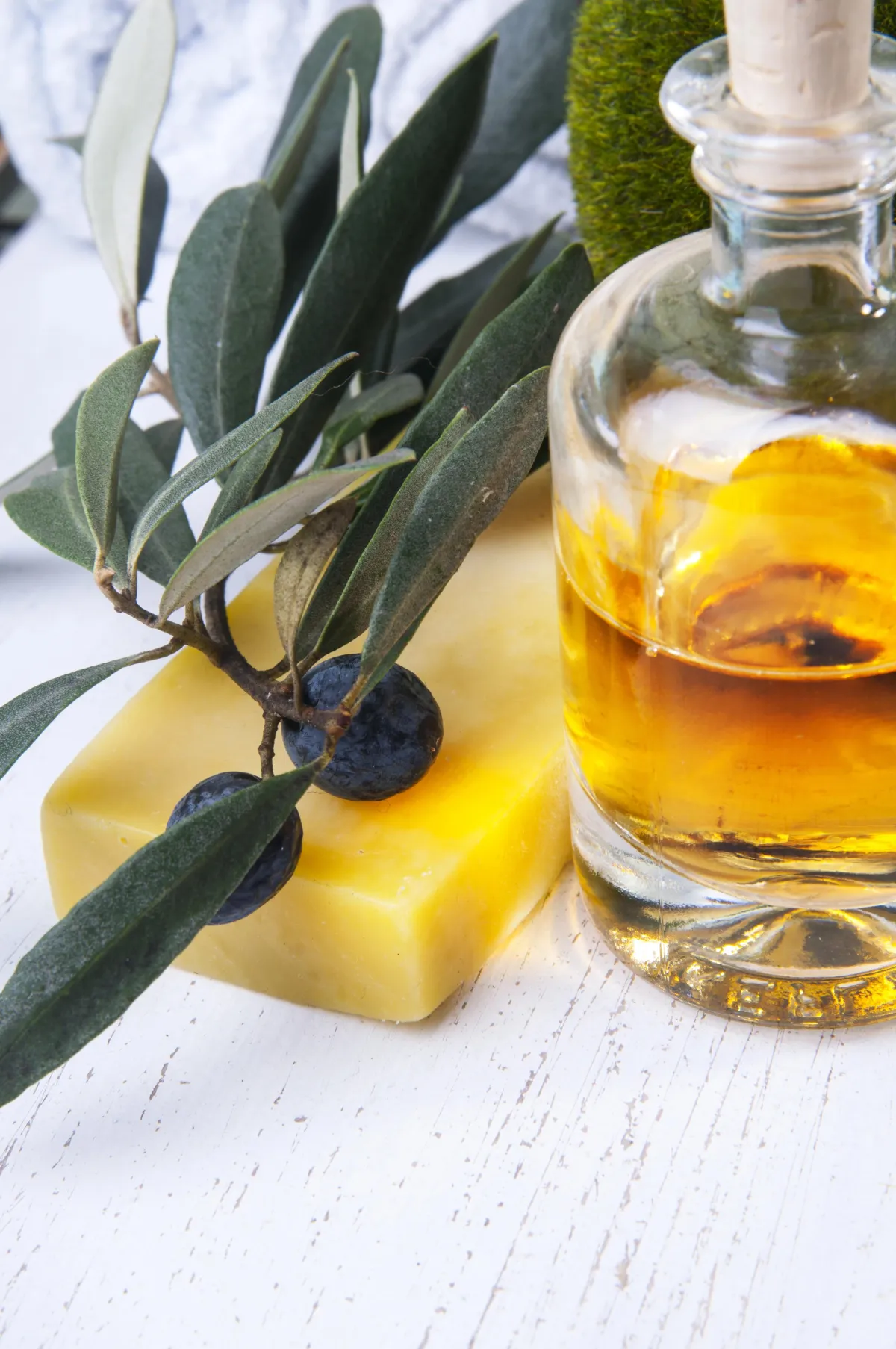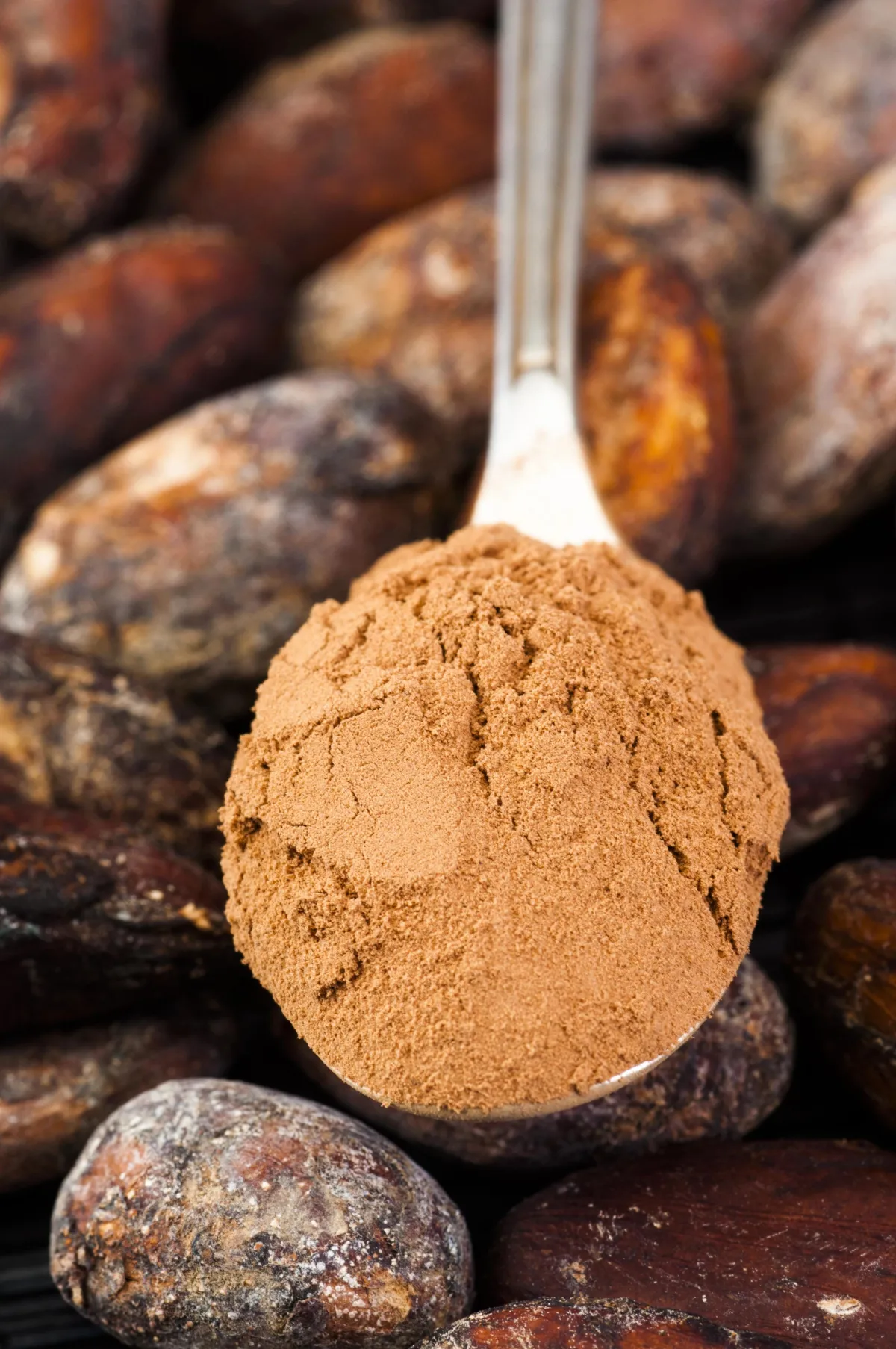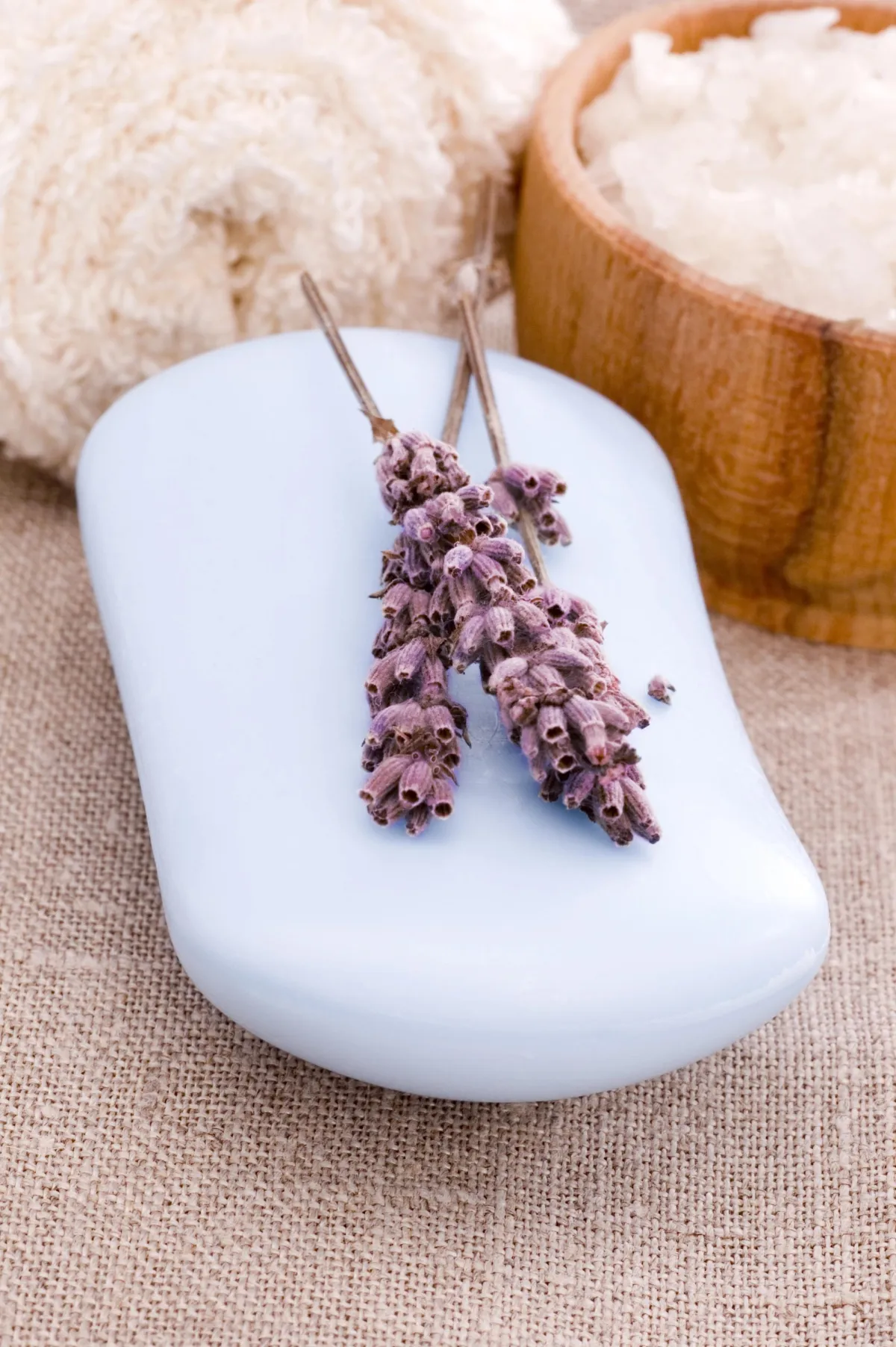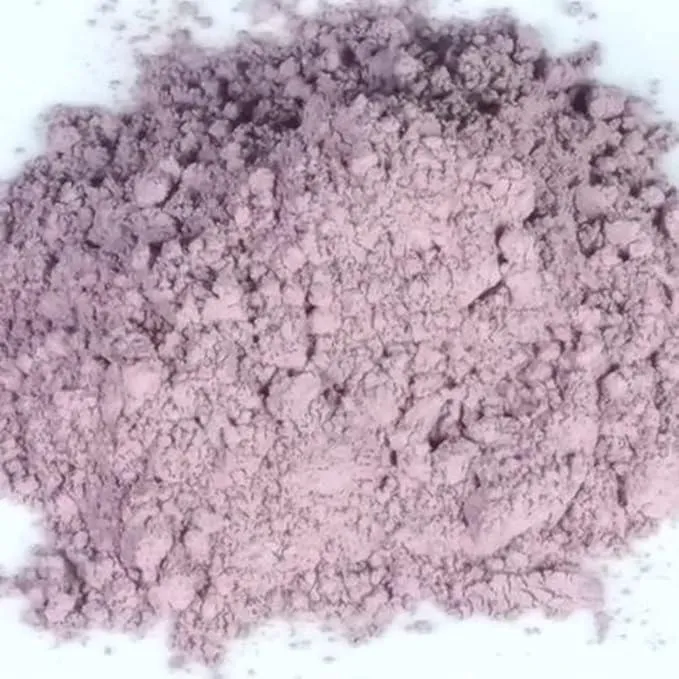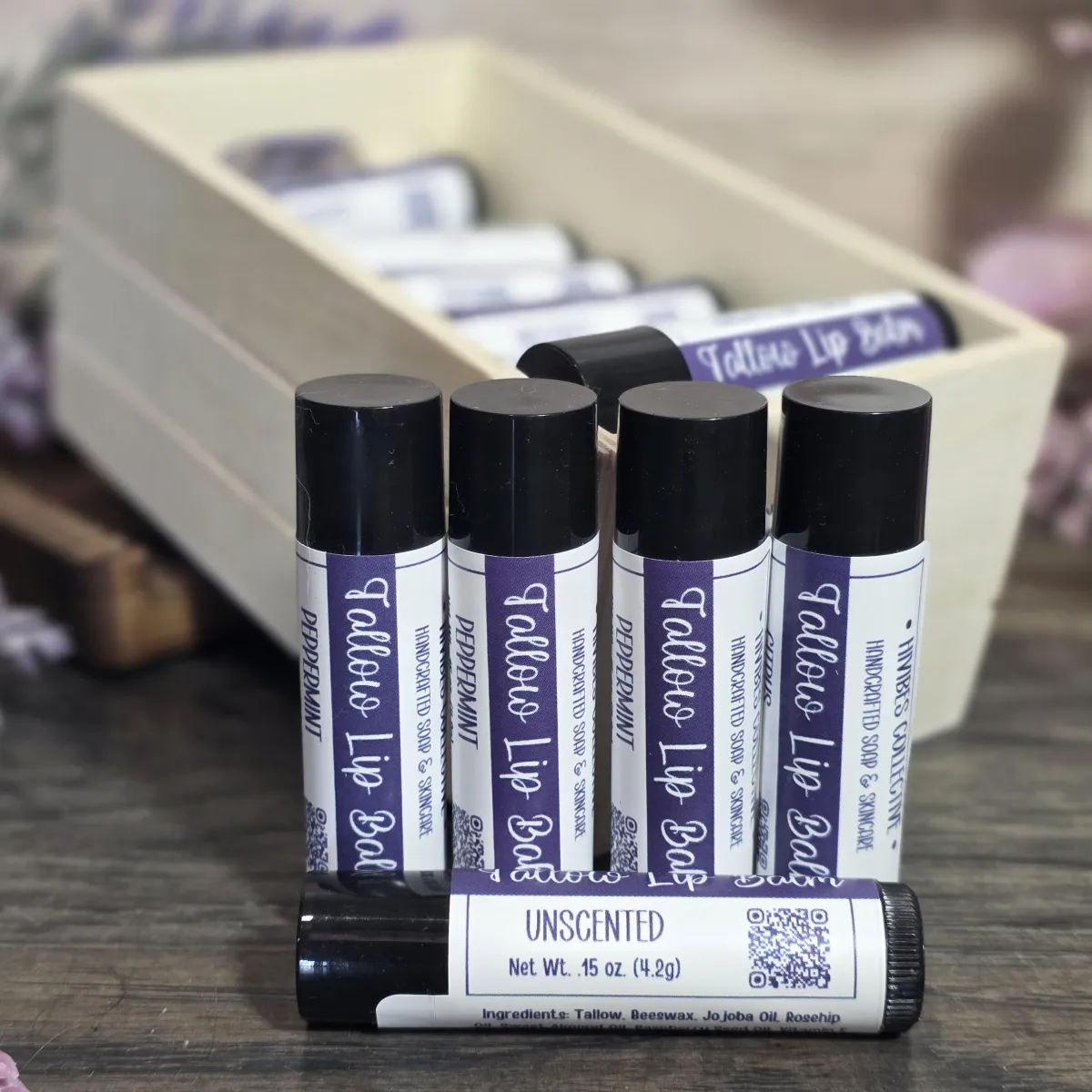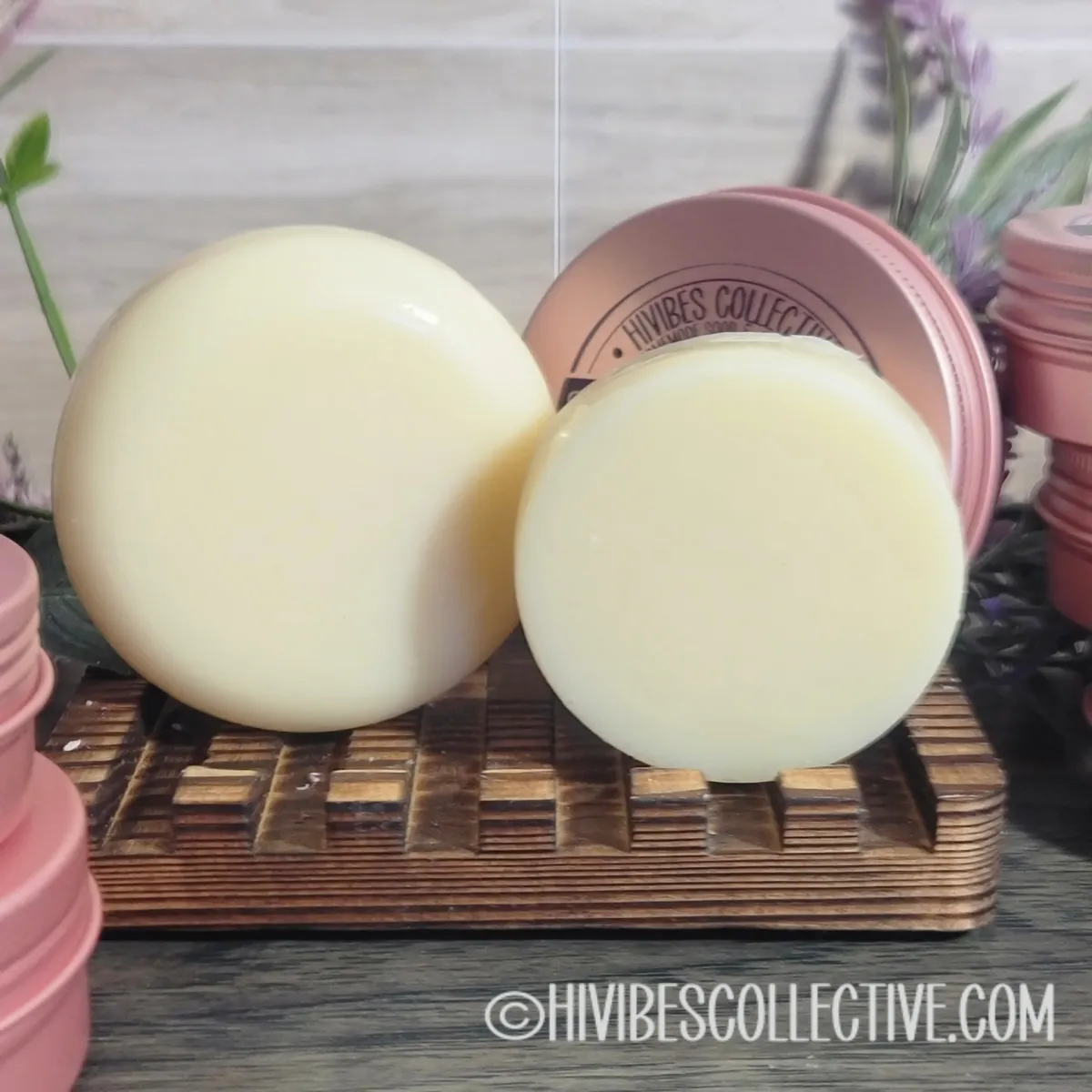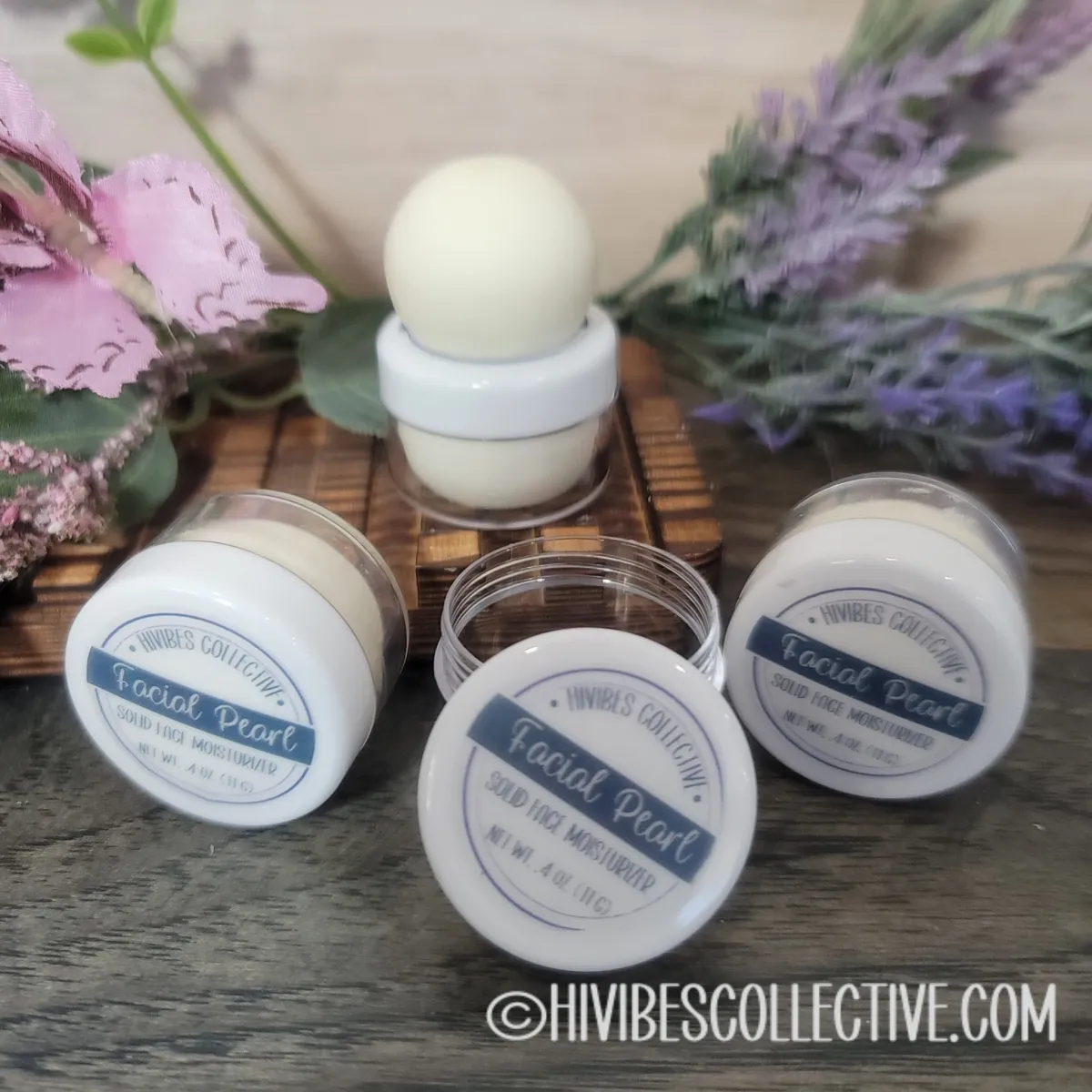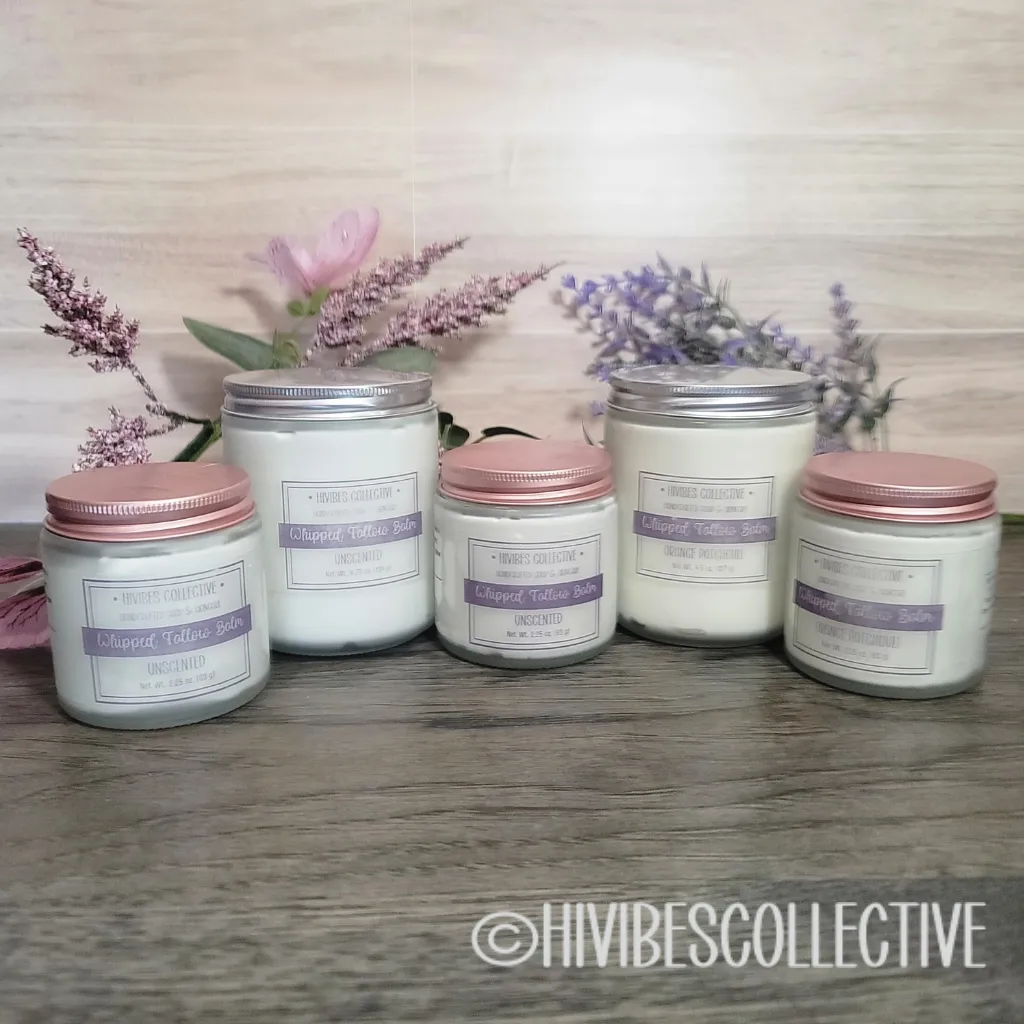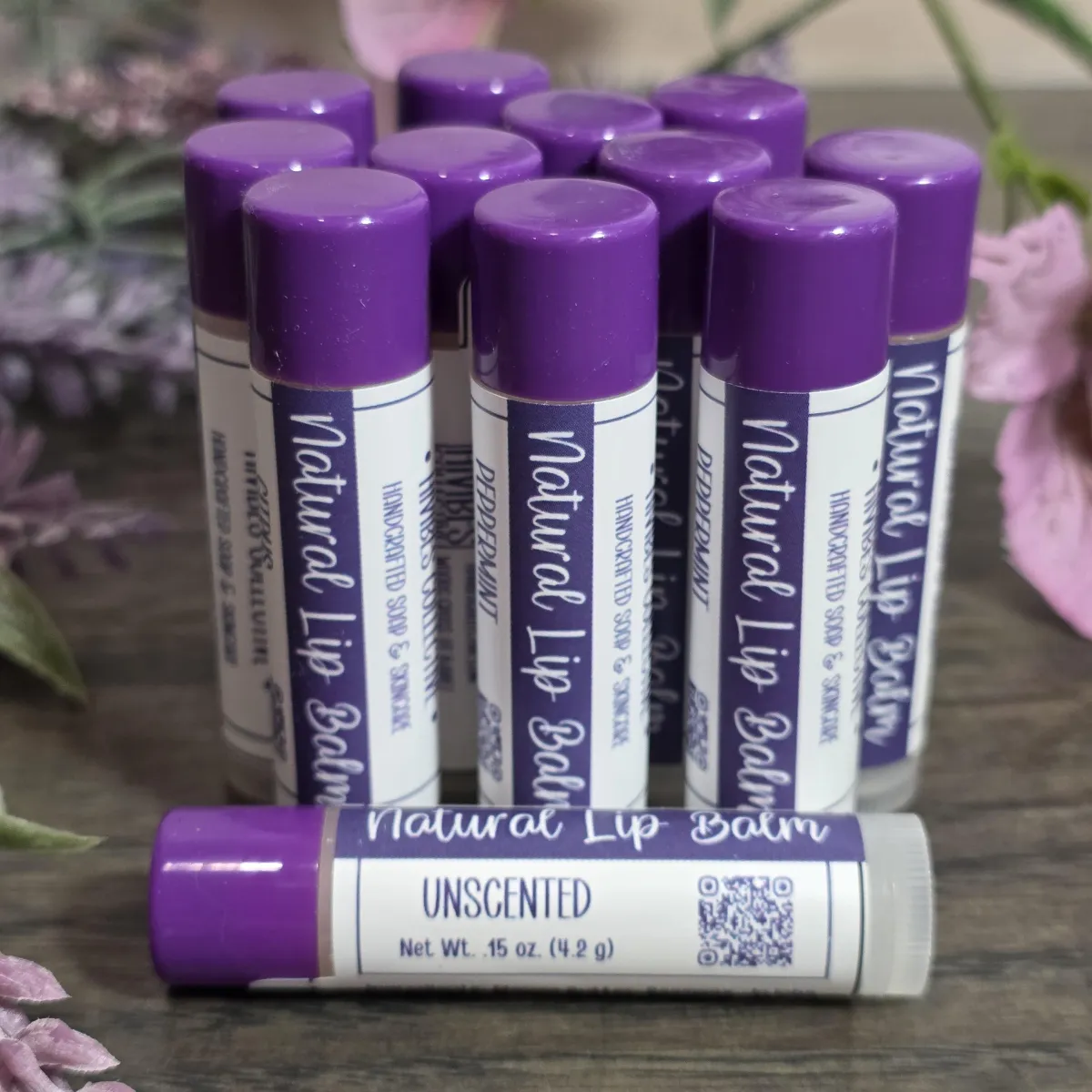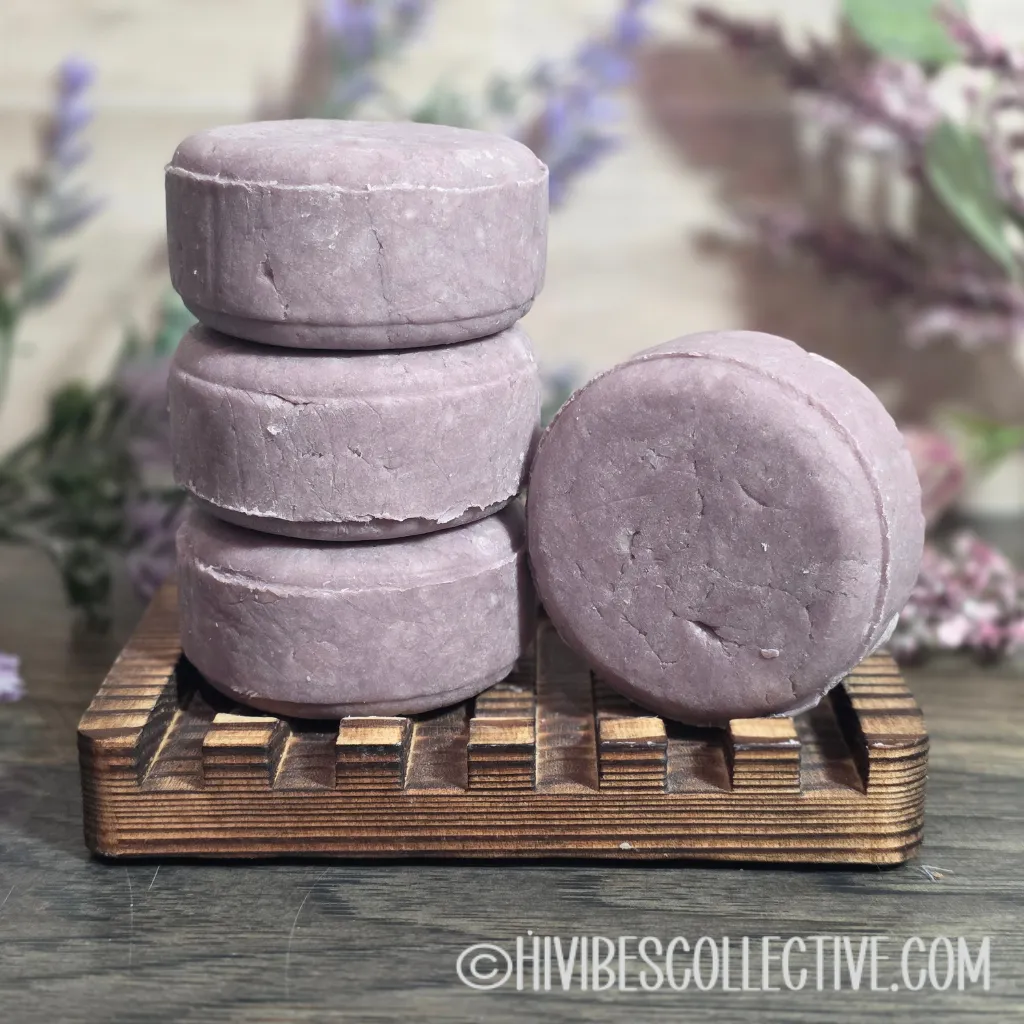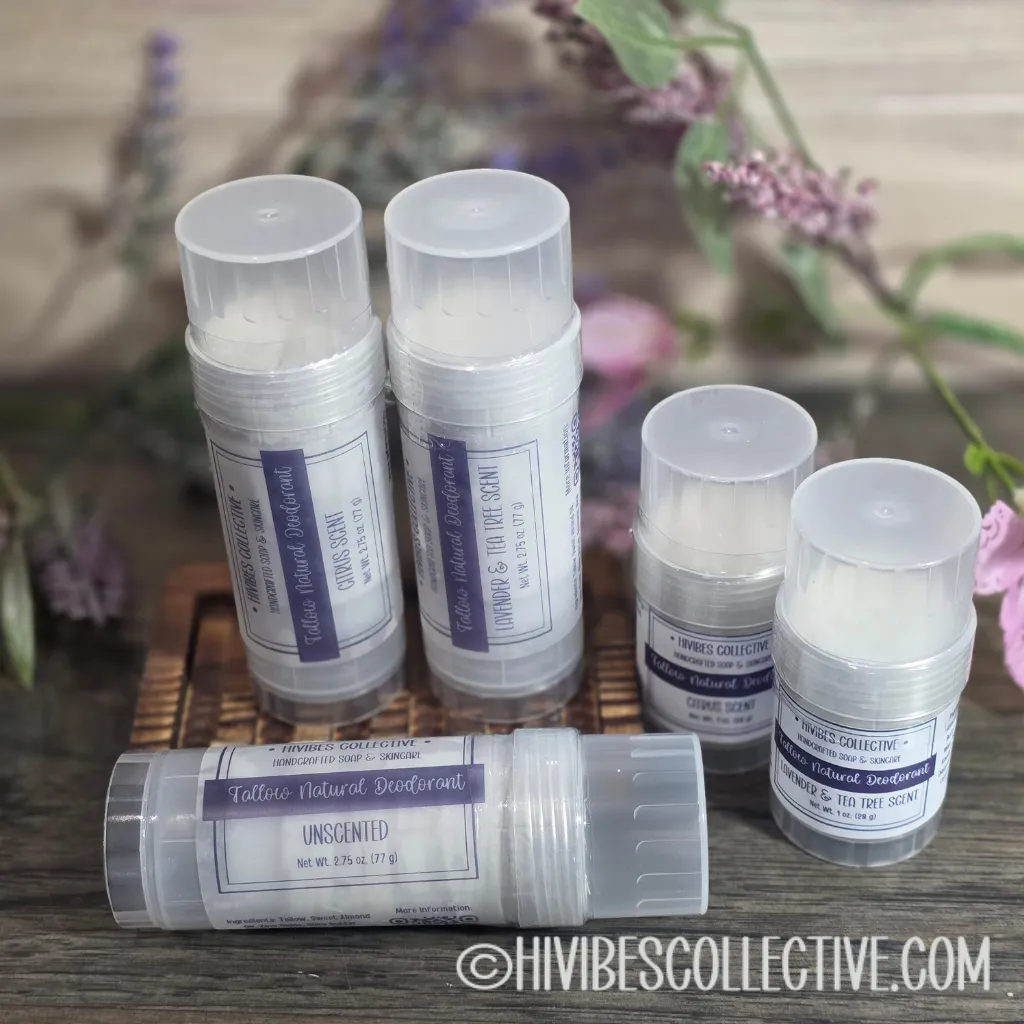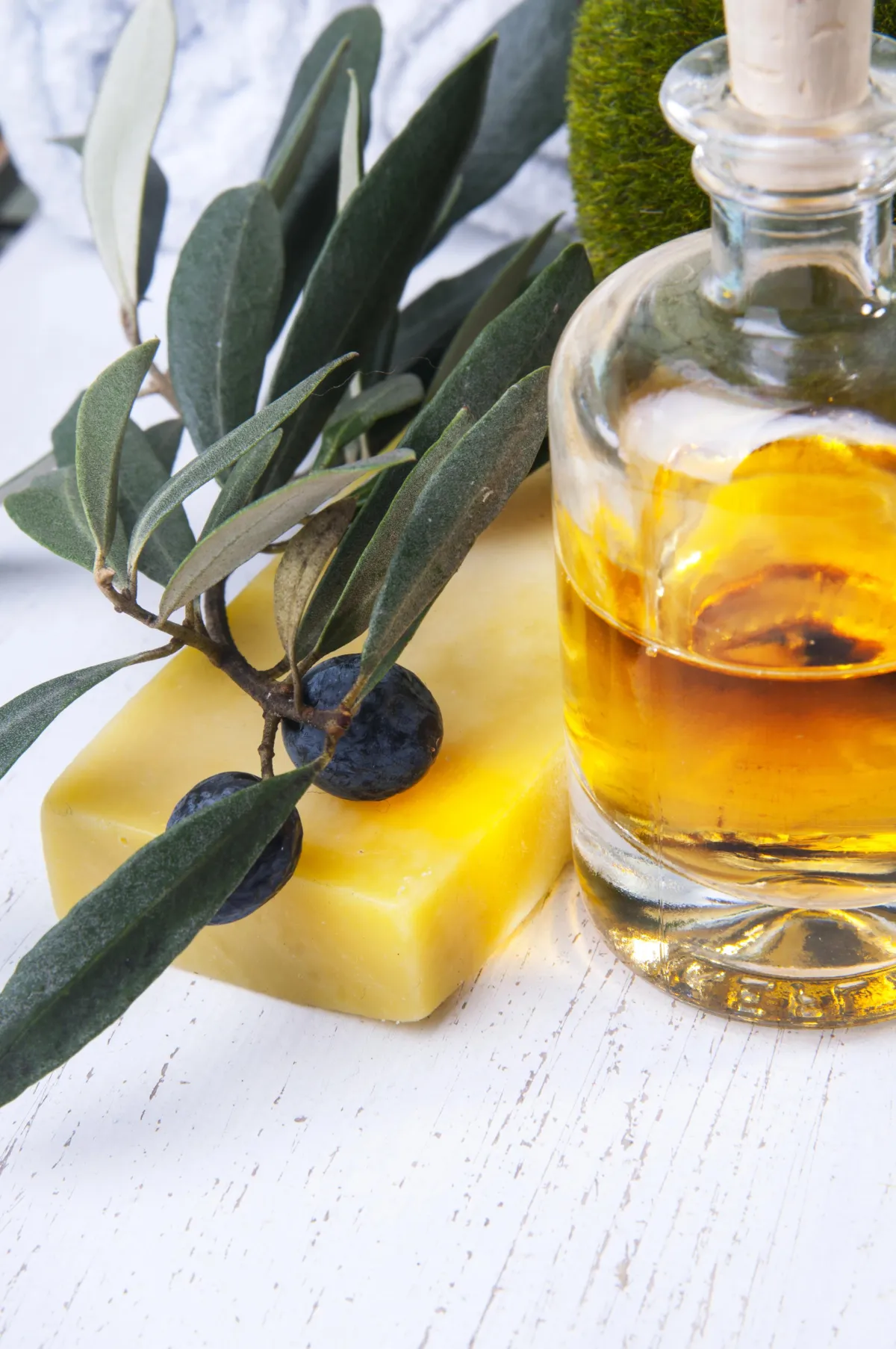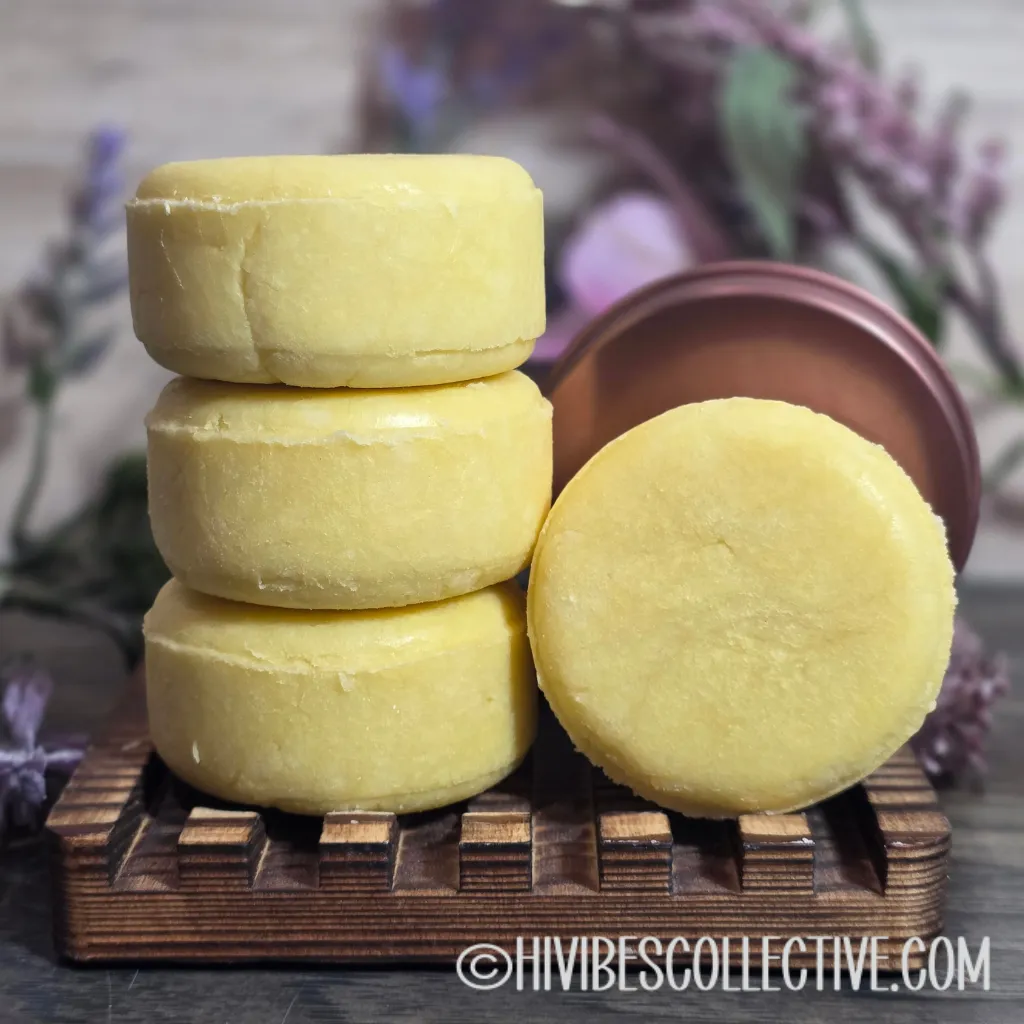Additives - Herbs, Special Oils, Milks, etc.
We love incorporating nature’s most special gifts into our soaps and skincare products. From soothing botanical extracts to nutrient-rich herbal infusions, every ingredient is chosen with care to enhance your skincare experience. Whether it’s a touch of calendula for its gentle nature, a swirl of rich clays for a deep cleanse, or an infusion of chamomile to calm and comfort, each addition brings something unique to the table.
While labeling guidelines prevent us from making specific claims about the properties of these ingredients, we encourage you to explore their traditional uses and discover how they can complement your skincare routine. Thoughtfully selected and carefully blended, our herbal and botanical ingredients are here to help you enjoy the simple beauty of nature—one lather at a time.
Rosemary Oil
Rosemary Oil: The Herbaceous Skin Revitalizer
Rosemary oil (Rosmarinus officinalis) is more than just a fragrant kitchen staple—it’s a centuries-old beauty elixir. Beloved by ancient civilizations, from the Greeks and Romans to medieval herbalists, rosemary has long been associated with memory, vitality, and purification. Its invigorating scent and potent botanical benefits make it a powerhouse ingredient in natural skincare and soapmaking.
In soapmaking, rosemary oil adds a refreshing, herbaceous aroma while offering skin-loving benefits. Its natural antibacterial and antifungal properties make it an excellent addition to soaps designed for oily or acne-prone skin. Plus, it contributes a touch of mild astringency, helping to balance excess oil while still keeping skin soft and hydrated. Some soapmakers also use rosemary extract as a natural preservative, as it helps extend the shelf life of oils and butters.
For skincare, rosemary oil is a true multitasker. It’s rich in antioxidants that help fight free radical damage, keeping skin looking youthful and healthy. Its natural anti-inflammatory properties make it great for soothing redness and irritation, while its ability to stimulate circulation can promote a healthy glow. Rosemary oil is often used in scalp treatments, as it’s believed to support hair growth and scalp health. However, it’s a potent essential oil and should always be diluted before applying directly to the skin. Since high-quality rosemary essential oil is steam-distilled from fresh or dried rosemary leaves, its price can vary—but when you see it in a product, know that you’re getting a botanical boost packed with history and herbal goodness!
Tea Tree Oil
Tea Tree Oil: The Mighty Skin Purifier
Tea tree oil (Melaleuca alternifolia) is nature’s ultimate skin cleanser, revered for its powerful purifying and soothing properties. Native to Australia, tea tree oil has been a staple in Aboriginal medicine for centuries, used to treat wounds, infections, and skin irritations. Today, it remains one of the most beloved essential oils in natural skincare, thanks to its ability to clarify, balance, and refresh the skin.
In soapmaking, tea tree oil is a game-changer, lending its crisp, medicinal aroma and potent antimicrobial properties to every bar. It’s especially beneficial in soaps formulated for oily, acne-prone, or problem skin, as it helps combat blemishes and excess oil without over-drying. Its natural antibacterial and antifungal qualities make it a fantastic ingredient for deodorizing soaps, foot care products, and even scalp-friendly shampoo bars.
For skincare, tea tree oil is a powerhouse. It’s packed with terpinen-4-ol, a compound known for its antimicrobial and anti-inflammatory properties, making it excellent for calming breakouts, soothing irritated skin, and addressing minor cuts and scrapes. With a non-comedogenic rating of around 1, it’s unlikely to clog pores, making it a favorite for those with acne-prone skin. Because tea tree oil is highly concentrated, it should always be diluted before direct application. High-quality tea tree oil is steam-distilled from the leaves of the Australian tea tree, and while it’s widely available, the purest versions can be a bit pricier. When you see it in a product, know that you’re getting one of nature’s most potent skin-loving ingredients!
Tamanu Oil
Tamanu Oil: The Ancient Skin Healer
Tamanu oil (Calophyllum inophyllum) is a true skincare treasure, revered for centuries by Polynesian and Southeast Asian cultures for its remarkable healing properties. Derived from the sun-dried nuts of the tamanu tree, which thrives in coastal regions of the South Pacific, this rich, emerald-green oil is packed with powerful skin-regenerating compounds. Used traditionally to soothe wounds, burns, and even stretch marks, tamanu oil is a prized ingredient in modern natural skincare.
In soapmaking, tamanu oil is a luxurious addition, known for its deeply conditioning and skin-soothing properties. Though too precious to be a primary soap base oil, even a small amount helps create a rich, creamy lather that leaves skin feeling nourished and pampered. Its antimicrobial and anti-inflammatory benefits make it especially useful in soaps designed for sensitive, dry, or troubled skin.
For skincare, tamanu oil is nothing short of magic. It’s loaded with calophyllolide, a unique compound known for its wound-healing and anti-inflammatory effects, making it an excellent choice for scars, blemishes, and irritated skin. Its rich fatty acid profile deeply hydrates without leaving a greasy residue, and with a non-comedogenic rating of about 2, it’s suitable for most skin types—including those prone to acne. Because tamanu trees produce only a small amount of oil per harvest and the drying process takes weeks, high-quality tamanu oil can be quite expensive. But when you see it in a product, you’re experiencing one of nature’s most powerful and time-honored skin healers!
Red Raspberry Seed Oil
Red Raspberry Seed Oil: The Antioxidant-Rich Skin Protector
Red raspberry seed oil (Rubus idaeus) is like a hidden gem in the world of skincare—lightweight yet packed with powerful benefits. Cold-pressed from the tiny seeds of raspberries, this golden oil is a byproduct of the juicing industry, making it both sustainable and luxurious. While raspberries have been enjoyed for centuries as a delicious fruit, their seeds hold a treasure trove of skin-loving nutrients that make this oil a coveted ingredient in high-end skincare.
In soapmaking, red raspberry seed oil is often used as a superfatting oil, adding an extra touch of nourishment to a bar. Though too delicate to be a base oil, it contributes gentle conditioning properties and a silky feel. Because of its high antioxidant content, it helps protect and rejuvenate the skin, making it an excellent addition to luxury soaps designed for sensitive or mature skin.
For skincare, red raspberry seed oil is a superstar. It’s rich in omega-3 and omega-6 fatty acids, vitamin E, and polyphenols, all of which help soothe, hydrate, and protect against environmental stressors. It’s also known for its natural anti-inflammatory properties, making it a great choice for calming redness, irritation, and even eczema-prone skin. Plus, it has been studied for its potential to provide mild UV protection—though it should never replace sunscreen! With a non-comedogenic rating of around 0-1, it’s perfect for all skin types, including acne-prone and sensitive skin. Because of the labor-intensive process required to extract it, red raspberry seed oil is on the pricier side, but when you find it in a product, know that you’re treating your skin to one of nature’s most potent protectors!
Rosehip Seed Oil
Rosehip Seed Oil: The Radiance-Boosting Skin Elixir
Rosehip seed oil (Rosa canina or Rosa rubiginosa) is a skincare superstar, prized for its ability to brighten, nourish, and rejuvenate the skin. Used for centuries by the ancient Egyptians, Mayans, and indigenous Chilean cultures, this lightweight yet potent oil is extracted from the seeds of wild rose bushes. Unlike rose essential oil, which comes from the petals, rosehip seed oil is all about deep hydration and skin renewal.
In soapmaking, rosehip seed oil is a luxury ingredient, often used as a superfatting oil to boost a bar’s conditioning properties. While too delicate to be a primary soapmaking oil, it adds a silky smoothness and a touch of extra nourishment, making it a wonderful addition to facial or high-end body soaps. Its natural antioxidants and essential fatty acids help support healthy, glowing skin.
For skincare, rosehip seed oil is legendary for its ability to promote an even complexion and restore skin’s natural glow. It’s packed with vitamin C, vitamin A (natural retinoids), and omega-3 and omega-6 fatty acids, making it excellent for reducing the appearance of scars, fine lines, and hyperpigmentation. With a non-comedogenic rating of about 1, it absorbs quickly and is suitable for most skin types, including acne-prone and sensitive skin. Because rosehip seeds must be cold-pressed in small batches to preserve their nutrients, pure rosehip seed oil can be on the pricier side—but when you see it in a product, you know you’re treating your skin to one of nature’s most powerful rejuvenators!
Argan Oil
Argan Oil: The Liquid Gold of Skincare
Argan oil (Argania spinosa) is a true skincare luxury, often called "liquid gold" for its rich golden hue and incredible beauty benefits. Native to Morocco, this rare and precious oil is extracted from the kernels of the argan tree, which thrives in the arid landscapes of North Africa. For centuries, Berber women have used argan oil to nourish their skin, protect their hair, and even heal wounds. Today, it remains one of the most sought-after ingredients in high-end skincare and haircare products.
In soapmaking, argan oil is a decadent addition, bringing deep conditioning and a silky, moisturizing feel to every bar. Because it’s a delicate and expensive oil, it’s typically used as a superfatting ingredient rather than a primary base oil. Its high concentration of vitamin E and essential fatty acids makes it especially beneficial for dry, mature, or sensitive skin, adding a touch of luxury to handcrafted soaps.
For skincare, argan oil is a powerhouse of hydration and protection. It’s packed with antioxidants, omega-6 and omega-9 fatty acids, and vitamin E, helping to restore skin elasticity, reduce the appearance of fine lines, and shield against environmental stressors. With a non-comedogenic rating of about 0-1, it’s lightweight, fast-absorbing, and perfect for all skin types—including acne-prone skin. Because argan trees grow only in a small region of Morocco and the oil is traditionally hand-extracted, pure argan oil is one of the pricier beauty oils on the market. When you see it in a product, know that your skin is being treated to one of the finest, most nourishing oils nature has to offer!
Calendula Extract
Calendula Extract: The Soothing Skin Savior
Calendula extract (Calendula officinalis), also known as marigold, has been a staple in natural skincare for centuries. Revered by ancient cultures—from the Egyptians to the Romans—calendula was used for its healing properties in treating wounds, inflammation, and skin ailments. Known for its vibrant yellow-orange petals, this cheerful flower is packed with antioxidants, flavonoids, and saponins, which give it its renowned skin-soothing qualities.
In soapmaking, calendula extract is a beloved ingredient that imparts gentle, healing properties to every bar. It helps calm irritated, dry, or inflamed skin while still providing a luxurious lather. It also pairs beautifully with other calming ingredients like chamomile, lavender, and shea butter, creating soaps that nourish, repair, and soothe the skin. Its mild, herbaceous scent makes it a perfect fit for sensitive skin formulations.
For skincare, calendula extract is a true powerhouse of comfort and healing. It’s especially beneficial for sensitive or irritated skin, as it helps reduce redness, inflammation, and even minor wounds or cuts. Calendula is known for its antibacterial, antifungal, and anti-inflammatory properties, making it an excellent choice for acne-prone or eczema-prone skin. It also supports the skin’s natural healing processes, promoting regeneration and leaving skin feeling calm and restored. With a non-comedogenic rating of 0, calendula is gentle enough for all skin types, including the most delicate.
Best Uses: Soothing soaps, creams, and lotions for sensitive or irritated skin; healing balms and oils for minor cuts, scrapes, and skin conditions; gentle facial cleansers for dry or eczema-prone skin; baby skincare products and after-sun care
Cautions: Calendula extract is generally considered safe for most people, but as with any plant extract, a patch test is recommended, especially for those with allergies to daisies, chrysanthemums, or ragweed. While rare, some individuals may experience mild irritation or allergic reactions.
Aloe Vera Extract
Aloe Vera Extract: The Cooling, Healing Miracle
Aloe vera extract (Aloe barbadensis miller) has been a beloved natural remedy for centuries, known for its cooling, soothing, and skin-rejuvenating properties. Used by ancient Egyptians, Greeks, and Romans, aloe vera was considered a symbol of immortality and was prized for its ability to heal burns, cuts, and skin irritations. This remarkable plant's gel-like substance, extracted from the thick, fleshy leaves, is packed with vitamins, minerals, amino acids, and antioxidants that make it a go-to ingredient in both skincare and medicine.
In soapmaking, aloe vera extract is a must-have for creating gentle, moisturizing bars. Its hydrating and cooling qualities make it especially perfect for summer soaps or after-sun care. Aloe vera helps restore moisture balance to dry skin while calming any redness or irritation. It also adds a silky, smooth feel to the lather and pairs well with other skin-nourishing ingredients like calendula, chamomile, or lavender.
For skincare, aloe vera extract is often referred to as the "plant of immortality" for good reason. It hydrates, nourishes, and heals the skin, making it ideal for soothing burns, cuts, sunburns, or minor skin abrasions. Rich in antioxidants, vitamins A, C, and E, aloe vera helps protect the skin from environmental damage while supporting collagen production, making it a great addition to anti-aging products. With a non-comedogenic rating of 0, it’s perfect for all skin types, especially those with sensitive, acne-prone, or dry skin.
Best Uses: Cooling soaps and body washes for sunburn or irritated skin; hydrating facial creams, gels, and serums; after-sun care and healing balms; soothing facial masks for calming inflammation and redness.
Cautions: Aloe vera extract is generally safe for most people and is well-tolerated on the skin. However, some individuals may have an allergic reaction to aloe vera, especially if they are allergic to garlic, onions, or tulips (due to cross-reactivity). As with all plant-based ingredients, it’s a good idea to perform a patch test before using it extensively. Also, if you are using aloe vera topically and have a sunburn, be cautious of overuse, as it can sometimes cause the skin to feel slightly tighter as it dries.
Activated Charcoal
Activated Charcoal: The Deep-Cleansing Detoxifier
Activated charcoal is the ultimate skin-purifying powerhouse, known for its ability to draw out toxins, excess oil, and impurities like a magnet. Used for centuries in ancient medicine and skincare rituals, activated charcoal was prized by the Egyptians for wound care and by Ayurvedic and Chinese medicine practitioners for its detoxifying effects. Made from carbon-rich materials like coconut shells, wood, or bamboo that have been heated at high temperatures, activated charcoal becomes highly porous, giving it incredible absorption capabilities.
In soapmaking, activated charcoal is a game-changer for deep-cleansing bars. It helps remove dirt, oil, and bacteria from the skin without stripping away essential moisture, making it perfect for oily, acne-prone, or combination skin types. It also adds a stunning black or deep gray color to soaps, giving them a sleek, modern look while enhancing their cleansing power. Paired with ingredients like tea tree oil, peppermint, or clay, activated charcoal soaps create a refreshing, detoxifying experience.
For skincare, activated charcoal is a go-to ingredient for clarifying and balancing the skin. It’s particularly beneficial for those dealing with clogged pores, blackheads, or excess oil production. Its gentle exfoliating properties help slough away dead skin cells, leaving the skin looking smoother and clearer. With a non-comedogenic rating of 0, it won’t clog pores, making it a fantastic choice for acne-prone and sensitive skin alike.
Best Uses: Deep-cleansing facial soaps and body bars; purifying face masks and scrubs for acne-prone skin; detoxifying scalp treatments and shampoos; exfoliating and clarifying body scrubs.
Cautions: While activated charcoal is generally safe for all skin types, overuse may cause dryness, especially for those with very dry or sensitive skin. It’s best used in moderation—2-3 times a week for facial skincare—to maintain a healthy balance.
Pumice Powder
Pumice Powder: The Gentle Yet Mighty Exfoliator
Pumice powder is a natural exfoliant that helps buff away dead skin cells, revealing smooth, refreshed skin. Formed from volcanic lava that rapidly cools and traps gas bubbles, pumice stone has been used for centuries—by ancient Egyptians for skincare and even by the Romans for hair removal! When ground into a fine powder, it becomes an incredibly effective, yet gentle, exfoliating ingredient perfect for soaps and scrubs.
In soapmaking, pumice powder adds a mild to intense exfoliating texture, depending on the particle size used. It’s an excellent addition to bars designed for rough or calloused skin, such as gardener’s soap, mechanic’s soap, or foot scrubs. Unlike synthetic microbeads, pumice powder is 100% natural and biodegradable, making it an eco-friendly exfoliating option. It pairs beautifully with moisturizing oils and butters to create a cleansing bar that polishes the skin while preventing over-drying.
For skincare, pumice powder works wonders in scrubs, foot treatments, and heavy-duty hand soaps. It helps remove stubborn dirt, grease, and dry, flaky skin without being overly abrasive. Since it’s a physical exfoliant, it’s best suited for areas that need deep exfoliation, like feet, elbows, and hands, rather than delicate facial skin. With a non-comedogenic rating of 0, it won’t clog pores, making it safe for all skin types when used appropriately.
Best Uses: Exfoliating soaps for hands, feet, and body Heavy-duty cleansing bars for mechanics, gardeners, and crafters Foot scrubs to smooth dry, cracked heels Natural alternative to plastic microbeads in scrubs and skincare.
Cautions: While pumice powder is gentle, overuse can lead to irritation, especially on sensitive or thin skin. It’s best used in moderation—once or twice a week for body exfoliation and sparingly on delicate areas. Always moisturize after use to keep skin balanced and hydrated. If using in facial products, opt for ultra-fine pumice powder to avoid micro-tears in the skin.
Walnut Hull Powder
Walnut Hull Powder: The Natural, Nutty Exfoliator
Walnut hull powder is a powerhouse exfoliant that gently polishes away dead skin cells, leaving skin feeling smooth and refreshed. Made from finely ground walnut shells, this all-natural ingredient provides a sustainable and biodegradable alternative to synthetic exfoliants. Used for centuries in traditional skincare and hair treatments, walnut hull powder has been prized for its ability to deeply cleanse and revitalize the skin while promoting a healthy glow.
In soapmaking, walnut hull powder adds a natural exfoliating texture, making it an excellent choice for body bars, scrubs, and foot soaps. It provides a mild to medium grit, depending on the particle size, helping to slough off dry, rough patches without being overly abrasive. Its rich, earthy brown color also lends a beautiful natural tint to soaps, giving them a warm, rustic appearance. When blended with moisturizing oils and butters, it creates a well-balanced exfoliating soap that cleanses and nourishes simultaneously.
For skincare, walnut hull powder is an effective yet gentle exfoliant, perfect for body scrubs, hand soaps, and even scalp treatments. It helps unclog pores, remove buildup, and promote cell turnover for a fresher, brighter complexion. With a non-comedogenic rating of 0, it won’t clog pores, making it safe for most skin types. However, because it is a physical exfoliant, it’s best used on the body rather than delicate facial skin, where a finer exfoliant may be more suitable.
Best Uses: Exfoliating body soaps and scrubs for smoother skin; heavy-duty cleansing bars for mechanics, gardeners, and crafters; foot scrubs to soften rough, calloused areas; scalp exfoliation treatments for removing buildup and promoting healthy hair.
Cautions: While walnut hull powder is a natural exfoliant, it should be used in moderation to avoid over-exfoliation, especially on sensitive or thin skin. The granules can be too abrasive for the face, so ultra-fine versions should be used if applied to delicate areas. People with nut allergies should avoid walnut-based skincare products, as they may trigger allergic reactions. Always perform a patch test before use.
Diatomaceous Earth
Diatomaceous Earth: The Silky-Smooth Skin Refiner
Diatomaceous earth (DE) is a unique, ultra-fine exfoliant made from the fossilized remains of tiny aquatic organisms called diatoms. Rich in silica, this mineral has been used for centuries in skincare for its ability to gently polish and purify the skin while absorbing excess oil and impurities. Known for its soft, powdery texture, DE provides a silky-smooth exfoliation that feels luxurious while deeply cleansing the skin.
In soapmaking, diatomaceous earth adds a fine, gentle exfoliating quality without the gritty texture of harsher exfoliants. It helps create a smooth, creamy lather while drawing out toxins and excess oil, making it a fantastic ingredient for detoxifying and balancing soaps. Unlike coarser exfoliants like pumice or walnut powder, DE is mild enough for daily use and leaves skin feeling refined and refreshed rather than overly scrubbed. It also enhances slip in shaving soaps, providing a smoother glide for razors.
For skincare, diatomaceous earth is a powerhouse for deep cleansing and exfoliation. Its high silica content helps promote collagen production, making it beneficial for maintaining firm, youthful-looking skin. It’s excellent for absorbing excess oil, making it ideal for oily and acne-prone skin types. With a non-comedogenic rating of 0, it won’t clog pores and is gentle enough for use in face masks, scrubs, and even tooth powders.
Best Uses: Detoxifying and balancing facial soaps and masks; gentle exfoliating body bars and scrubs; absorbent, oil-balancing cleansers for oily and acne-prone skin; silky shaving soaps for a smooth, irritation-free shave.
Cautions: Diatomaceous earth is very fine and lightweight, so care should be taken when handling it to avoid inhalation, as the dust can irritate the lungs. It’s best to use food-grade DE in skincare products to ensure purity and safety. Though gentle, overuse may cause dryness, so it’s best paired with hydrating ingredients like aloe, honey, or nourishing oils.
Citric Acid
Citric Acid: The Skin-Brightening pH Balancer
Citric acid is a naturally occurring alpha hydroxy acid (AHA) derived from citrus fruits like lemons, oranges, and limes. Used for centuries in skincare, citric acid is prized for its ability to gently exfoliate, brighten the skin, and balance pH levels in products. It’s a key ingredient in everything from bath bombs to facial peels, helping to refine skin texture and promote a radiant complexion.
In soapmaking, citric acid is primarily used to adjust pH levels and combat soap scum caused by hard water. It helps create a more conditioning, lather-rich soap by neutralizing excess minerals. In bath bombs, citric acid is the magic behind that fun, fizzy reaction when combined with baking soda, making bath time a luxurious and skin-softening experience. It also boosts the longevity of handmade soaps by preventing oxidation.
For skincare, citric acid acts as a gentle exfoliant, helping to slough off dead skin cells and reveal a fresher, more even-toned complexion. Its natural astringent properties help tighten pores and regulate excess oil, making it particularly beneficial for acne-prone and oily skin. With a non-comedogenic rating of 0, it won’t clog pores and works well in cleansers, toners, and peels. Additionally, its antioxidant properties help fight free radicals and environmental stressors, supporting overall skin health.
Best Uses: pH balancer in soaps to improve lather and combat hard water effects, key ingredient in bath bombs for a luxurious fizzing effect; brightening facial toners, cleansers, and exfoliating treatments; hair care products to remove buildup and enhance shine.
Sugar
Sugar: The Sweet Secret to Rich Lather and Bubbles
Sugar isn’t just for sweet treats—it’s a fantastic natural ingredient that boosts lather, enhances bubbles, and adds a luxurious feel to soaps and scrubs! While it has been used in skincare for centuries as a humectant and gentle exfoliant, its ability to supercharge bubbles in handmade soaps makes it a favorite among soapmakers.
In soapmaking, sugar is a game-changer for those who love a rich, foamy lather. When added to soap formulations, it increases bubble size and longevity, making for a more indulgent washing experience. This is especially useful in coconut oil-heavy or hard bar soaps, which tend to produce smaller bubbles. Sugar also helps speed up the emulsification process in hot-process soapmaking, giving bars a smoother texture. It dissolves easily, leaving no grit behind, and works beautifully in shampoo bars, body washes, and foaming hand soaps.
For skincare, sugar acts as a natural humectant, drawing moisture into the skin and helping to maintain hydration. It’s also a mild exfoliant, making it a great addition to scrubs for buffing away dead skin cells while leaving skin feeling soft and smooth. Unlike salt, sugar is gentler and non-drying, making it ideal for facial scrubs and body polishes. Its water-soluble nature ensures a clean rinse without leaving behind residue.
Best Uses: Bubble-boosting ingredient in bar soaps, liquid soaps, and shampoos; moisturizing body scrubs for smooth, hydrated skin; natural humectant in lotions and body polishes; sugar scrubs for gentle exfoliation without irritation.
Cocoa Powder
Cocoa Powder: The Rich & Chocolatey Skin Treat
Cocoa powder isn’t just for decadent desserts—it’s a fantastic natural colorant and skin-loving ingredient in handmade soaps and skincare! Made from ground cocoa beans, this antioxidant-rich powder has been used for centuries in beauty rituals, dating back to the Mayans and Aztecs, who valued cacao for its nourishing and rejuvenating properties. Beyond its delicious aroma, cocoa powder brings deep brown tones to soaps and offers skin-boosting benefits.
In soapmaking, cocoa powder is a natural and gentle colorant that imparts a warm, chocolatey hue, ranging from light brown to rich dark brown, depending on the concentration. It’s perfect for adding depth and visual appeal to swirled or layered soaps, especially when paired with vanilla, coffee, or spice-based essential oils. Additionally, cocoa powder contributes to a creamy, luxurious lather, making it a wonderful addition to moisturizing bars. Its mild exfoliating properties can also help remove dead skin cells, leaving skin feeling soft and refreshed.
For skincare, cocoa powder is packed with antioxidants that help fight free radicals and promote a more youthful, radiant complexion. It contains natural anti-inflammatory compounds, making it soothing for irritated or sensitive skin. The gentle exfoliating action of cocoa powder helps brighten dull skin while supporting circulation for a healthy glow. With a non-comedogenic rating of 0-1, it’s unlikely to clog pores, making it suitable for most skin types, including oily and acne-prone skin.
Best Uses: Natural brown colorant in cold-process; antioxidant-rich facial masks to brighten and tone the skin; mild exfoliating body scrubs for a soft, radiant glow; decadent chocolate-scented bath and body products.
Cautions: While cocoa powder is generally safe for all skin types, those with extremely sensitive skin should do a patch test, as natural compounds in cocoa may cause mild irritation in rare cases. If using in high amounts in soap, it may darken lather slightly. When storing, keep cocoa powder-based products in a cool, dry place to prevent clumping due to humidity.
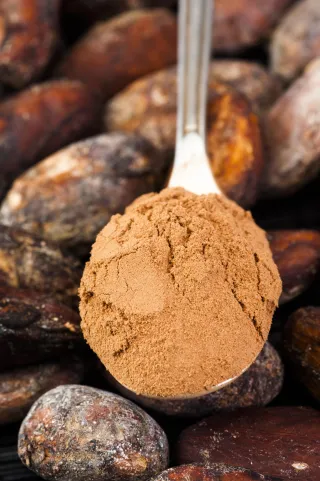
Goat Milk
Goat Milk: Creamy, Dreamy Skin Nourishment
Rich, velvety, and full of skin-loving goodness, goat milk is a time-honored treasure in natural skincare. Cleopatra was rumored to bathe in it for its beauty benefits—and modern skin lovers are still swooning over its gentle, creamy touch. In cold-process soap, goat milk transforms an everyday bar into a luxurious skin treat, offering nourishment, hydration, and a silky-smooth lather that’s hard to beat.
Goat milk is naturally rich in lactic acid, a gentle alpha hydroxy acid (AHA) that helps exfoliate dead skin cells and encourage a radiant glow—without the harshness of synthetic peels. It’s also packed with vitamins A, D, and B6, as well as essential fatty acids and minerals like selenium, which all work together to support skin health and softness. Because of its pH level, which is similar to that of human skin, goat milk helps maintain the skin’s natural barrier, making it a favorite for those with sensitive, dry, or mature skin.
Though goat milk is non-comedogenic and gentle on most skin types, it does require special handling in soapmaking and adds a bit to the cost due to its perishability and sourcing. When using farm-fresh or ethically sourced milk, the quality and price reflect that extra care. But trust us—once you feel the difference, you’ll know why goat milk is considered the gold standard for creamy, conditioning soap.
Colloidal Oats
Colloidal Oats: Comfort Food for Your Skin
If your skin could snack, it would choose colloidal oats—the ultimate soothing treat! Made from finely ground oats that are carefully processed to preserve their natural lipids, proteins, and soothing compounds, colloidal oatmeal has been cherished for centuries as a skin-calming hero. Used in ancient Egyptian baths and traditional remedies around the world, it’s still a go-to for everything from dry patches to sensitive skin and soothing baby care.
In handcrafted soap and skincare, colloidal oats add a silky smoothness that feels like a gentle hug for your skin. They’re packed with beta-glucans and antioxidants, which help protect and restore the skin’s natural barrier. That makes them perfect for calming itchiness, dryness, and irritation, especially in products designed for sensitive or mature skin. In soap, they lend a soft, creamy texture and help create a luxurious lather without any harshness.
Colloidal oats are non-comedogenic, meaning they won’t clog pores, and they’re often recommended by dermatologists for people with eczema, psoriasis, or other sensitivities. They’re gentle, affordable, and a little goes a long way—making them a superstar additive for skin-loving soaps and balms that offer both comfort and care. Think of them as your product’s built-in cozy sweater for the skin!
Honey
Honey: Liquid Gold for Glowing Skin
Sweet, sticky, and downright legendary—honey has been prized for thousands of years, not just as a natural sweetener, but as a skin-loving powerhouse. Used by ancient Egyptians, Greeks, and even Cleopatra herself in beauty rituals, honey is a true time-tested treasure. In cold-process soap and skincare, it acts as a humectant, meaning it draws moisture into the skin, helping to maintain softness and hydration naturally.
But that’s just the beginning! Honey is also rich in natural enzymes, antioxidants, and antibacterial properties, making it a fantastic choice for clarifying and balancing the skin. It can gently support acne-prone skin, soothe irritation, and leave your complexion feeling fresh and clean—without harsh ingredients. In soap, honey also contributes to a rich, creamy lather and gives the bar a slightly warmer, golden hue.
Honey is considered non-comedogenic and is generally safe for most skin types, though it may not be suitable for those with severe bee-related allergies. Since high-quality, raw, or local honey can be more expensive than commercial, processed types, it can add to the value of your soap—especially when sourced from small-scale or ethical beekeepers. Every drop adds luxury, nourishment, and a touch of natural sweetness to your handcrafted creations.
Coconut Milk
Coconut Milk: Creamy, Dreamy, and Naturally Luxe
Tropical, velvety, and ultra-gentle—coconut milk is a luscious plant-based alternative that brings serious luxury to your skin. Made by blending the white flesh of mature coconuts with water, this creamy liquid is packed with natural fats, vitamins, and antioxidants, making it a favorite for those seeking gentle hydration and a touch of indulgence. In cold-process soap, coconut milk creates a rich, bubbly lather and leaves your skin feeling soft and pampered, never stripped.
Coconut milk contains vitamin C, E, and B vitamins, along with lauric acid, a fatty acid with soothing and antimicrobial properties. These nutrients help keep skin feeling hydrated, calm, and balanced, especially for those prone to dryness or irritation. It’s a wonderful addition for sensitive or mature skin and makes a great vegan-friendly alternative to goat milk—without sacrificing that silky, nourishing feel.
It’s also non-comedogenic, which means it won’t clog pores, and it's gentle enough for daily use on both face and body. While not as expensive as some animal-derived or specialty ingredients, high-quality coconut milk still adds value, especially when using pure, unsweetened, preservative-free versions. It’s a creamy tropical upgrade for your soap—plant-based luxury with island flair.
Magnesium Hydroxide
Magnesium Hydroxide: The Gentle Odor Fighter
Say hello to Magnesium Hydroxide, your underarm’s new best friend! Naturally derived from seawater or mineral deposits, this ingredient is a gentle but effective odor neutralizer that helps keep you feeling fresh without harsh chemicals or irritation. Unlike traditional deodorant ingredients like baking soda, which can sometimes cause redness or sensitivity, magnesium hydroxide is known for being skin-friendly—even on the most delicate areas.
What makes it shine? Magnesium hydroxide works by raising the pH on your skin just enough to make it harder for odor-causing bacteria to thrive—without disrupting your skin’s natural balance. It doesn’t clog pores or block sweat (so your body can still do its detox thing), but it helps keep odor at bay in a clean, non-toxic way. It's especially ideal for those switching to natural deodorants for the first time or anyone with sensitive skin.
This ingredient is non-comedogenic, meaning it won’t clog pores, and it's completely aluminum-free, making it a favorite in clean beauty circles. While it may be a little pricier than some conventional alternatives, it’s a small price to pay for something that’s safe, soothing, and seriously effective. When you see magnesium hydroxide on the label, you can trust you’re getting natural freshness without the fuss.
Vitamin E
Vitamin E: The Skin’s Little Guardian
Meet Vitamin E, the multitasking antioxidant your skin adores! This fat-soluble vitamin is a powerhouse when it comes to protecting, soothing, and softening skin. In both soap and skincare, Vitamin E pulls double duty—it helps extend the shelf life of delicate oils by slowing oxidation, and it offers a nurturing boost to the skin by fighting off free radicals and environmental stressors. Think of it as your product’s tiny-but-mighty bodyguard, guarding freshness and radiance all at once.
Vitamin E is especially loved for its ability to nourish and calm dry or irritated skin, promote the appearance of a healthy complexion, and improve moisture retention. It’s often found in products meant for mature, sensitive, or dry skin because of its reputation for supporting elasticity and softness. Whether it's added to lip balms, body butters, serums, or soap bars, it helps the skin feel supple and protected—without any greasy heaviness.
It’s naturally derived from vegetable oils like sunflower, wheat germ, or soy, and while it’s present in small amounts, it makes a big impact. Vitamin E is non-comedogenic at low concentrations, so it's generally safe for most skin types, including acne-prone skin. Since it’s such a sought-after antioxidant, high-quality Vitamin E (especially in its natural form, d-alpha tocopherol) can come with a higher price tag, but the benefits to both product stability and skin health make it well worth the investment. It’s the little drop of magic your skin (and your formulas) will thank you for.
Panthenol
Panthenol (Pro-Vitamin B5): The Moisture Magnet
If your skin or hair is thirsty for TLC, Panthenol is here to help! Also known as Pro-Vitamin B5, this humectant is a favorite in both skincare and haircare for its ability to attract and hold onto moisture like a sponge. It helps skin feel softer, smoother, and more resilient, while giving hair a healthy, hydrated boost. In everything from conditioner bars and face creams to lotions and lip balms, Panthenol is that quiet overachiever that leaves everything it touches feeling better.
Panthenol works by penetrating the skin and hair shaft, where it helps bind water and improve elasticity. On skin, it soothes dryness, calms irritation, and even supports the skin’s natural barrier function—making it ideal for sensitive, dry, or stressed-out skin. On hair, it adds a touch of shine, reduces frizz, and helps detangle without weighing strands down. It’s especially beloved in shampoo and conditioner bars, where it contributes to smoothness, softness, and manageability.
This ingredient is non-comedogenic and plays well with others, making it easy to incorporate into a wide range of natural formulations. And while it’s gentle enough for daily use, the quality form (usually the more bioavailable D-panthenol) can be a little more costly, especially in leave-on formulas. But with its skin- and hair-loving benefits, a little goes a long way—making Panthenol a quiet hero in your routine that your skin and strands will thank you for.
leucidal
Leucidal® Liquid: Friendly, Fermented, and Naturally Protective
Say hello to Leucidal® Liquid, the gentle guardian of natural skincare! Derived from Lactobacillus, the same family of bacteria used to ferment kimchi and yogurt, Leucidal® is a fermentation-based preservative that helps keep products fresh and safe—without the use of synthetic or harsh chemicals. It works by inhibiting the growth of bacteria and microbes, extending shelf life while maintaining a clean label and a skin-loving vibe.
Perfect for natural formulations like creams, lotions, toners, and even some water-containing deodorants, Leucidal® offers a mild, non-irritating alternative to traditional preservatives like parabens or phenoxyethanol. It’s especially popular in eco-conscious and sensitive-skin formulations, thanks to its gentle profile. And while it doesn’t offer broad-spectrum protection against all molds and yeasts on its own, it pairs beautifully with other natural boosters like gluconolactone or AMTicide Coconut to create a full-spectrum preservative system.
Though it’s not the most budget-friendly ingredient (due to its fermentation process and specialty use), it’s well worth the investment in water-based products where shelf stability is essential. Customers love seeing it on an ingredient list because it means your formula is not only effective, but also aligned with clean, plant-powered values. Think of Leucidal as your natural skincare's behind-the-scenes protector—silent, safe, and incredibly effective.
AMTicide Coconut
AMTicide® Coconut: Tropical Defense for Your Skincare
Meet AMTicide® Coconut, a natural antimicrobial powerhouse with a sunny, tropical origin! Made by fermenting Cocos nucifera (coconut) with Lactobacillus, AMTicide is a plant-based preservative enhancer that helps protect your skincare products from yeast, mold, and fungi—all while being gentle on your skin. It's a perfect companion to Leucidal® Liquid, working together to provide broad-spectrum protection in natural, water-containing formulations like lotions, creams, mists, and serums.
Why is it so loved? AMTicide is both eco-friendly and skin-friendly, offering a clean alternative to synthetic preservatives. It contains naturally occurring antimicrobial peptides, which help your product stay fresh without compromising your skin’s balance. Plus, it’s non-irritating, non-sensitizing, and often considered suitable for even sensitive skin types. Since it’s coconut-derived, it brings a touch of the tropics into your routine—but without any overwhelming scent or greasy feel.
Though more costly than traditional preservatives, AMTicide Coconut is a premium choice for clean beauty. It's biodegradable, aligned with green formulating standards, and most importantly—it does its job quietly and effectively. For customers who want safe, natural skincare with integrity, AMTicide is a reassuring ingredient that shows you care about what goes on their skin—and what stays out.
HiVibes Collective
Handcrafted tallow soap & skincare using the very best local or authentically sourced ingredients.
Woods Cross, Utah, 84087
©2026 HiVibes Collective

